#source? i am their marriage councilor
Explore tagged Tumblr posts
Text
they're married, and there's nothing you can do about it


#source? i am their marriage councilor#sorry. i couldnt resist but i'm not actually coming back yet#i'm actually way too mad about them not giving triworlds a song and instead doing MORE brothers unit songs#bye for now unless you are friends w/ me and receive ap from me.... in which case.......enjoy#obey me#diamephi#diavolo#mephistopheles
31 notes
·
View notes
Text
The One Where Ethy Finds Out:
Part 1:

Click on the moodboard for better quality! Pictures sourced off Google images and Pinterest, but the moodboard is of my own creation.
Here's my entry to @emilyhufflepufftlk 300 followed challenge - I'm so sorry its late!
I've actually used the prompt I chose for the 200 follower challenge for this one as it seemed to fit in really well, I hope that's ok!
A massive thank you to @axe-does-writing for beta reading this for me, you're amazing! 💕
As it turns out, I'm incapable of writing anything short, so this has ended up in three parts.
Warnings: angst, fluff, spoilers for Finan's past (mainly in Part 3), Finan's undeserving complex, Uhtred playing relationship councilor 😂
Hope you enjoy!
---------------------------------------------------
It was a warm spring afternoon, the fresh breeze carried a sweet scent of freshly budding flowers.
The people of Rumcofa were content, a buzz of excitement hummed through the town as preparations for the upcoming Beltane Festival were underway.
That evening, there was to be two large bonfires, cattle herds would be driven between the two fires in the hopes of purifying them and increasing their fertility for the farming season. Later, couples would dance around the flames, new courtships or marriages would be announced, and a huge feast would be held to honour the gods.
The women of the town, both pagan and saxon alike, were gathered together, picking flowers to braid into each other's hair, or making flower crowns. Gossip was exchanged, making bets on which young people would make the best matches and hoping for a fruitful year.
This was where Uhtred found his sister, settled slightly apart from the other women outside his hall, making a flower crown of her own.
He watched her for a moment, she had yet to notice him, her gaze fixed solely on the half-finished headpiece in her hands. Her brow furrowed in concentration, the same way it did back when she was trying to perfect her letters when they were children. Her lips pursed when a particular flower stem refused to sit exactly where she wanted to place it. A sigh of frustration escaped her as she lightly threw the crown onto the table in front of her in defeat. At least for the time being.
It was then that she looked up, her eyes lighting slightly when she caught sight of her brother.
"Uhtred! What are you doing here? I thought you would be with the other men preparing the bonfires?" She stretched, her neck sore from hunching over for so long.
"I was actually looking for you" He told her, taking a seat in the chair next to her.
"Oh? And to what do I owe the privilege?" She teased, but Uhtred could tell her heart wasn't in it, her smile didn't quite reach her eyes; She looked tired. He wondered if had anything to do with what he wanted to ask her.
"It is Finan. He has seemed withdrawn these past few days. I wondered if you knew why he is in such a foul mood?"
She bit at her bottom lip, looking away from him as she sighed through her nose.
"I don't know, maybe you should try asking him." She mumbled quietly.
"Have you two had a disagreement?" He furrowed his eyebrows.
"Not exactly…"
Uhtred leaned forward, trying to catch Ethy's gaze. "Well, what then? There's clearly something bothering the both of you."
"Uhtred please-" She groaned.
"Ethy, you are my sister and Finan is my best friend, I cannot let whatever this is continue when the pair of you are miserable."
"We are not miserable! We have had a very minor misunderstanding, that is all! When will you learn to mind your own business?" She cried, exasperated with her brother.
"I will learn to mind my own business when you learn to accept help from those who care about you." He retorted.
Ethy rolled her eyes, sending him a stubborn glare, refusing to admit he was right. It's not like he was any better.
"If he has done something stupid I will happily knock some sense into him for you." He said with a smirk.
"I am perfectly capable of knocking some sense into him myself, thank you" She snorted a laugh, grateful to have Uhtred's support all the same.
"In truth, it is my own fault. I asked him about something he was not ready to talk about, I pushed him too far." Ethy admitted quietly, fiddling with a flower stem in her fingers.
"What happened?"
"I asked him about his life in Ireland, before he met you. Whether he had any family, that sort of thing… He told me he didn't think it mattered, it was like he shut down right in front of my eyes and he couldn't get out of the door fast enough." She explained.
Uhtred sighed. "Ethy, you must understand, what Finan and I went through, it is difficult to think about-"
"Don't lecture me Uhtred, I know it is hard to think about, I went through my own fair share of troubles, I know what it feels like." She said sternly.
"It isn't just that he doesn't want to talk about his past. Every time I think we are getting closer, it's like he retreats into himself, he pulls away, and I don't know why." She continued.
Uhtred just sat there in silence, not knowing what to say.
"I don't know if it's because he does not feel the same, if he does not want to commit himself, whether he does not trust me enough? I don't know if it is something I have done? I just want him to be able to talk to me. I want to help him, but I don't know how, and I don't want to press him if he isn't comfortable." She looked Uhtred in the eyes, hoping to find some answers.
"I am starting to think he is deliberately keeping something from me..." She murmured.
"Is he?" She asked earnestly. "Please Uhtred, I need to know." She begged.
"It's not for me to say" He replied quietly.
"So he is hiding something. Uhtred if you know what it is- for all I know he could be married or have bastard children from here to Scotland for all the travelling you have done. I don't want to be made a fool of."
Uhtred shook his head vehemently, trying to reassure her.
"Ethy, I swear, if I knew anything like that I would have told you and then strung him up by his balls for upsetting you. He's mad about you, any fool could see it. But anything from Finan's past is his to share, not mine."
Ethy nodded, a small smile of understanding hovering on her lips. She averted her eyes, back to the flower in her hand, seeing how it had crumpled under the weight of her squeezing it.
"You are right, I'm probably just overreacting anyway. Finan will tell me when he is ready and I won't push him. Now, if you'll excuse me, I've got to go and pick some more flowers." She rose to her feet, taking her flower crown with her as she left for the meadow.
Uhtred watched her go with concern in his eyes. He heaved a sigh as he rose to his feet. It is about time that he found Finan to get his side of the story.
---------------------------------------------------
I hope you enjoyed Part 1!
Tags:
Find Part 2 here
Find Part 3 here
@axe-does-writing @emilyhufflepufftlk @morosemagick @solinarimoon @lauwrite1225 @deans-ch-ch-cherrypie
#ems300#The One Where Ethy Finds Out#the last kingdom#tlk#tlk season 5#finan#finan the agile#finan x oc#uhtred
56 notes
·
View notes
Text
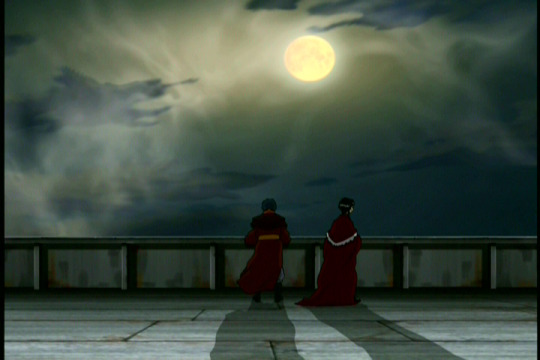
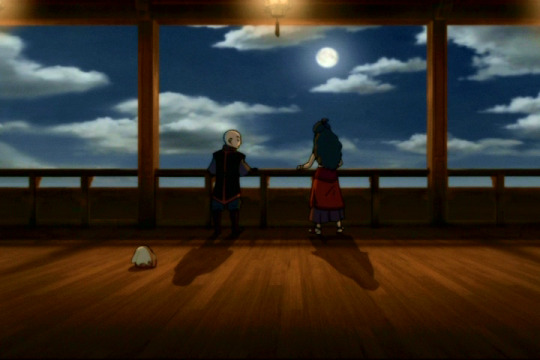
I’ve always been struck by the similar composition of these two scenes, even though they appear episodes apart.
Both couples are framed by moonlight, although neither scene is particularly romantic. Both scenes begin with Aang and Zuko alone under the moonlight, contemplating their troubles. I’ve talked a fair bit about moon symbolism and the way this show uses it. The moon can mean a lot of different things. Most often it is associated with Katara, because she is a female waterbender, but the moon is also strongly associated with femininity in the world of atla which incorporates the concept of yin and yang into its worldbuilding.
On a less literal level, the moon can be symbolic for hidden depths, desire, or negative emotions, usually the things we can't say out loud for fear that others will reject us. I’d say both of these scenes are negative. There’s a lot going on beneath the surface, certainly, and definitely a lot of desire, but neither couple are able to really communicate their feelings. Whereas in “The Southern Raiders” the moon symbolism was about purging negative emotions in a healthy way and returning to balance, the impression here is that neither couple is able to get past what is limiting them.
Both scenes start with Aang and Zuko alone with the moon, both worried about their current situation. Interestingly, although both characters are worried about their relationship, the real source of their problems is the same. Aang is anxious about his relationship with Katara but his real problem is that he will very soon have to face the Fire Lord, and in the scene in “The Awakening,” Zuko is also worried about facing the Fire Lord, although for an entirely different reason. In both scenes, their love interests arrive to comfort them. We see Aang separate from the rest of the group and Katara go off to find him. We don’t see why Zuko is alone on the deck of the ship but when Mai asks if he is cold, I think it can be assumed that he left the others below deck unexpectedly and that she went to find him. Katara tries to be supportive to Aang, and Mai, well, she tries to be supportive, but she pretty callously shuts Zuko down when he’s trying to express what’s going on with him. And even though Katara and Aang’s romantic tryst in this scene ends up being pretty disastrous, let’s take a moment to appreciate Katara here for actually listening to what her partner is saying without putting up with nonsense.
Katara: Are you all right?
Aang: [Angered.] No, I'm not! I hate this play! [Yanks his hat off and throws it on the ground.]
Katara: I know it's upsetting, but it sounds like you're overreacting.
vs the conversation between Zuko and Mai
Mai: Aren't you cold?
Zuko: I've got a lot on my mind. It's been so long, over three years since I was home. I wonder what's changed. I wonder how I've changed.
Mai: [Yawns.] I just asked if you were cold, I didn't ask for your whole life story. [Zuko frowns at her sarcastic response. Mai giggles and holds his face in her hands.] Stop worrying.
I remember taking a class in college on marriage and family. The professor used to work as a couple’s councilor, and one of the lasting things that stuck from that class was a lesson on conflict resolution. One of the things that you should never do is blame the other person for how they feel. Notice that Katara uses language that is affirming and validating (”I know it’s upsetting,”) but also tries to calm him down, also while not telling him what he should feel, but telling him how she is interpreting what she is hearing from him (”it sounds like you’re overreacting.”) This is also something I learned as a middle school teacher about conflict resolution, “so it sounds like you’re saying” / “so what I am hearing is” is language that lets a person know that they’ve been heard but also doesn’t tell them how they should feel and lets them express and feel their feelings on their own terms.
Contrast this with Mai’s reaction to Zuko, who, like Aang, readily spills immediately what he is feeling (although a lot less angrily.) And whether she meant it, Mai’s response communicates that she neither wants nor cares to hear about Zuko’s feelings. Then she directly tells him how he should feel. He should stop worrying. Which, unless you’re not sure, is so very not how you get someone to stop worrying.
Then there's the kiss, and I would argue that both of these scenes are a violation of their partners' consent.


Both Katara and Zuko express confusion about their feelings. Both are ignored, but at least Katara has enough experience with healthy relationships to recognize when her boundaries are being crossed and say no, and at least Aang is empathetic enough to realize he did something wrong.
159 notes
·
View notes
Text

Mary’s Letters & Submission:
Today on June tenth 1536 Mary wrote to her father and Cromwell, of the former she sent Cromwell a copy begging him to restore her to favor: ��Most humbly I prostrate before your noble feet, your most obedient subject and humble child, that hath not only repented her offences hitherto, but also decreed simply from henceforth and wholly next to Almighty God, to put my state, continuance and living in your gracious mercy.”
In her letter to Cromwell she said she would submit to her father’s demands as long as they didn’t offend her conscience:
“I trust you shall perceive that I have followed your advice and counsel, and will do in all things concerning my duty to the King’s Grace (God and my conscience not offended) for I take you for one of my chief friends, next unto his Grace and the Queen.
Wherefore, I desire you, for the passion which Christ suffered for you and me, and as my very trust is in you, that you will find such means through your great wisdom, that I be not moved to agree to any further entry in this matter than I have done. But if I be put to any more (I am plain with you as with my great friends) my said conscience will in no way suffer me to consent thereunto.”
Cromwell’s response was to submit to all of her father's demands but Mary wrote back saying that she wouldn't.
“Good Master Secretary,
I do thank you with all my heart, for the great pain and suit you have had for me for which I think myself very much bound to you. And whereas I do perceive by your letters, that you do mislike mine exception in my letter to the King’s Grace, I asure you, I did not mean as you do take it. For I do not mistrust that the King’s goddness will move me to do anything, which should offend God and my conscience. But that which I did write was only by the reason of continual custom. For I have always used, both in writing and speaking, to except God in all things.
Nevertheless, because you have exhorted me to write to His Grace again, and I cannot devise what I should write more but your own last copy, without adding or diminishing; therefore I do send you by this bearer, my servant, the same, word for word; and it is unsealed, because I cannot endure to write another copy. For the pain in my head and teeth hath troubled me so sore these two or three days and doth yet so continue, that I have very small rest, day or night.
Your assured bounded loving friend during my life,
Mary"
With the same determination, she wrote to her father:
“I have written twice unto Your Highness, trusting to have, by some gracious letters, token or message, perceived sensibly the mercy, clemency and pity of Your Grace, and upon the operation of the same, at the last also to have attained the fruition of your most noble presence, which above all worldly things I desire: yet I have not obtained my said fervent and hearty desire, nor any piece of the same to my great and intolerable discomfort I am enforced, by the compulsion of nature, effstones to cry unto your merciful ears, and most humbly prostrate before your feet for some little spark of my humble suit and desire praying to God to preserve Your Highness, with the Queen, and shortly to send you issue which shall be gladder tidings to me that I can express in writing,
Your Most Humble and Obedient Daughter and Handmaid,
Mary.”
Mary’s boldness infuriated Henry further who was getting frustrated with her stubbornness and he sent a delegation of councilors to confront Mary. At the head of this council was the Duke of Norfolk who told Mary that if she was his daughter he would punish her behavior by bashing her head against the wall until it was soft like a boiled apple. Later Chapuys visited her and told her that her cousin the Emperor was also urging her to submit, if she did not then her father would surely killed her. Mary never believed her father would go to such lengths but recent developments had made her see otherwise. Henry was not the same man Mary knew as a child. Any man or woman who defied Henry’s position as Head of the Church would be put to death, Mary was no different.
On June 22, Mary finally signed. The document entitled “The Confession of Me the Lady Mary” stipulated that she was a bastard born of incest and her parents’ marriage had been invalid.
“I do freely, frankly recognize and acknowledge that the marriage heretofore had between His Majesty and my mother (the late Princess Dowager) was by God’s law and Man’s law, incestuous and unlawful.
(Signed) MARY”
Mary was quickly back in favor and reestablished in her father’s court. Her submission had saved her life but cost her dearly. The imperial ambassador wrote that “this affair of the Princess has tormented her more than you think” and indeed it had, but it had also made her stronger. Chapuys would later write that Mary had become more pragmatic and conciliatory than her mother and her good understanding of people and politics had left her with many friends and allies at court.
Sources: Inside the Tudor Court by Lauren Mackay, The Myth of Bloody Mary by Linda Porter and Mary Tudor by Anna Whitelock.
36 notes
·
View notes
Text
keener
[ The Letter’s Source ]
keen·er/ˈkēnər/ noun 1.a person who wails or sings in grief for a dead person.
"I will remind this Council that Kurel An'Diel's removal is not yet up for debate as he has yet to fully violate the terms of his admiralty promotion. This is also not a character hearing--nor is it a platform for I-told-you-sos. I reject, at this time, Speaker Duskbringer's motion." She was on her fifth cigarette and surprisingly keeping her calm, "Kurel An'Diel's role as a husband and father is ,frankly, no one in this room's business but my own-- ...I will also remind this council that Kurel, aside from myself, is the oldest Councilor-- and did, help build this place."
The afternoon breeze shifted through the Starset Reach’s courtroom, a place they had called the Free Man’s Court. It felt hostile today, and Eilithe had readily blamed Reveria’s emotion-ruled judgement for such-- though she never said it aloud. Kur’elnth An’Diel’s name was a wired bomb as much as it was a ghost in the corner of the room. It made people angry-- it made her defensive. It was logical for people who loved her, people like Reveria, Feril, Hillier, and Clarcius to ask her why she was so vehement in her defense of a man that not two months after their marriage had wandered off somewhere into the world without a word to her. That is to say, Eilithe Duskbringer-An’Diel was well aware of how hopeless and pathetically in-love she was with her husband.
There was no justification beyond that. She loved him more completely than any man before him. Perhaps it was his unique brand of love that kept her hanging on. She was as attracted to his arrogance as she was his ambition. Kurel loved quietly, viscerally, and most importantly without expectation.
“Arbiter, Admiral An’Diel’s vulture has just flown in. I thought you’d want to know.”
When she left Stormwind, she had been excited or at the very least anxious. Croaks’ arrival meant news from Kurel and even if it was news that he wouldn’t be home for another month, she had opened the letter under the presence of the one and only promise he had ever made her: “I will always come home” Every letter she ever wrote, Eilithe read three times. But not his.
Eilithe,
The greatest and the worst secrets of my life have only ever been shared with three people in this world. Severin, Mavas and you. Lately, my list of regrets and mistakes expands by the creeping of every hour that moves beyond me. Of them all, only one do I have control over in some capacity to lighten.
When I told you about The Gate, about Archerous, and about what happened during those months. I did not tell you everything.
When Archerous demanded for its location and I refused, penance had to be paid for another hundred years. He did not choose to take Tailon, I gave Tailon to him and my sister was returned, dead.
In Severin’s devastation at the loss of his brother and his feeling that I had betrayed him, he left. For longer than I can remember, he and those of his lineage preceding him have served and sworn themselves to my family and its successors. There is more than expectation and tradition that holds him to this, so when he left me he returned to Tanaris. To serve Ammon.
By now I suspect you better realize that I did not simply vanish without cause or meaning and reading this far, you are outraged. That I would say nothing. That I would take no one.
“You can take the man out of the desert, but you can not take the desert out of the man.” A truth spoken by both my brother and lovers alike. Reveria understood that afternoon out on the pier while Eronal pleaded her case to me. Ammon’s tyranny was and never will be Deadsun’s problem. It is my problem and only mine. No argument or devotion will ever change that.
There is no good I do this world and there is no good I perhaps ever intend to do. Xavier may be the only thing of any -good- having come from me and you may have been the only thing good to have ever happened to me.
But I warned you. All those years ago. With me, there would only ever be misery and suffering. And that in the end, I would only ever disappoint you. No one survives me and writing to you, I am uncertain if I can survive myself. You could be right, that the problem and this record of repeated misfortune is me and not the threads that puppet us. If that is true, I am too old to be changed.
I love you. I will until this body finally gives out or something takes it out. And perhaps there is some solace that I can feel the piece of you that you bound to me and know you are alive. I do not know if or even when I might return. In the event of never, raise our children with ferocity and fire.
Whatever happens. Whatever you feel. Do not come for me. Do not wait for me.
Stay Alive.
Kur’elnth An’Diel
She was not angry-- she was devastated. It must have been fate looking out for her that her children were not home when the first wail came from the deepest part of her stomach. Her body hit the floor their bedroom and she gave herself to crying that buckled her chest. The only thanks she might have mustered for that moment was that she could feel in those moments of anguish vast and numbing loneliness, sobbing on the floor was the most present she had been in months.
Hours passed before she could breathe again, before she could uncoil and relax her muscles. Staring out the open balcony, she could swear she felt her soul twisting in his chest. And would it be that way, until one day he died and all at once the piece of her he took came rushing back to her?
Eilithe inhaled and sat up.
“What now?” She asked the room which accosted her with silence. Eilithe’s instinct, always, first and foremost was to run. But she had already run--she’d already kissed Death’s cheek and been pulled away. No safe house-- nor tree deep in the jungle was going to be her shelter. Her shelter was walking the sands alone to face all that he had done wrong in the world.
Would she be like her mother?
Dear Reveria, Before I ever met Kurel--before he and I ever gave in to lust or love, before a lot of things actually I used to write letters. Some of them I thought I people would read after I was dead and it’d give them closure or comfort or maybe a final fuck you.
I stopped, eventually. It got too painful writing for forgiveness from people that were long dead and didn’t need to forgive me anyway. Anyway, it used to give me peace writing them every night-- usually to Lucia, sometimes to my children though at the time it was just Eilonwy and I.
Right now, there is a hole in my chest and pieces keep falling out of it. It’s not just Kurel, who.. I’m sure you’ll figure out is gone before you ever read this letter. That is to say-- I hope you never read this, not until we’re old and my hair goes stark white like Endessa’s and we’re both raising grandchildren like our grandmothers.
But if you do, it means that I was out of options. It means that the ache-- not just from Kurel, but from thousands of years of disappointment, of loss of hope has finally gotten me.
I think I finally understand why my mother left after my father died, I started to understand it when I went to the jungle to die months ago but now with this finality-- I get it because as lonely as I was before, now I feel it in a sort of cosmic sense. I cannot help thinking that he was my ‘person’ -- you know, how Dianesh and Velerodra talk.
What if he was my person and that was it?
As stupid as it must sound to you, I wouldn’t take it back. I hope that I am strong enough to stay, Reveria. I hope that you and I can be as close as we used to be. I hope that I do not run. But if I do, know that above everything. I love you.
Eilithe
Kur’elnth An’Diel,
I bet you thought I’d be angry-- that I’d shred your letter and I would rip up all your clothes, throw the vanity off the balcony. Maybe even march an army to face Ammon and drag you back here to your home.
I want to be angry at you. I want to spit your name the way I always do-- act like you forced me into loving you for some sick and manipulative reason. But I can’t because you tried at every turn to stop this.
One day, when we’re both dead-- I imagine yours is the soul I will gravitate to. As warped, twisted, and rotten as you were-- there is a piece of you that I know I will feel entangled with me beyond Bwonsamdi’s gate.
I will not not rush there. Though while I write this I can think of little more than ending this pain, I know that our children need me. That Reveria and Velerodra need me. That Dead Sun needs me. You reminded me of that the last time, Kurel.
For all the shit. The pain and rage. I want you to know, in true me-fashion, you were wrong. You promised me misery and nothing else, but that’s not what I got at all. No, I got two more beautiful children. I got confidence and strength. I got so many laughs and stories.
You know I fell in love with you because of your stories, right?
And so this is ours. When our children ask of you-- I will not tell them you are the bastard son of Vishak An’Diel, True King of the Black Mirage. I will not tell them you were a coward who left us. I will not tell them about the fights or the leaving.
I will tell them that we had fun. I will tell them that you were stubborn, and that you were grouchy. But that you smirked when I said something funny. And sometimes you even laughed-- deep from your belly.
I will tell them that we loved each other as hard and for as long as we could. I will tell them you are a good man.
Until the gate,
Ei’lithene An’Diel
The letters found a home in a box buried in the back of their closest, sealed up, never to be seen. An inhale brought a final breath of his scent that lingered on his clothes throughout the space and Eilithe stood in it for only a moment longer before she pulled on a coat and headed out the door.

@kurel-andiel @revthepunchbear @velerodra-valesinger [this was painful to write, but Kurel is one of my best friends oocly and I mean this from the bottom of my heart, @deadsunharbor would not exist without her support over these last four years. Thank you for all the stories.]
20 notes
·
View notes
Text
50 Years After Stonewall: Where Are We Now?
By Talia Squires
June 28, 2019

50 years ago today a few people decided that enough was enough. They didn’t go out that night intending to change the world, but that’s just what they did. In the early hours of June 28, 1969, yet another police raid was carried out at the Stonewall Inn in Greenwich Village, New York. At the time, police raids on gay bars were still relatively common. In an effort to make New York City less friendly to its non-straight residents, the city was taking away or refusing liquor licenses for gay bars. Additionally, policemen were working undercover to entrap gay men for “solicitation" and people not considered to be wearing gender-appropriate clothing were arrested.
At the time of the raid, the Stonewall Inn was operating without a liquor license and this was the excuse that was needed to raid. After these raids, people who had been arrested were often publicly outed and shamed.
However, this night, things changed. As the police started their routine of lining everyone up and asking for identification, people started to refuse. When faced with this, the police decided to take everyone to the station. While waiting for more vehicles, a crowd began to gather outside. The crowd grew and grew into a spontaneous riot/protest. Two nights of rioting, demonstrations, and violence followed.
This outbreak of violence was one of many moments that brought attention to the need for action and the need to fight for equal rights. Many previous attempts to progress queer causes had been peaceful and based on assimilation and respectability. Now there was a movement to celebrate and flaunt our differences, rather than hide them.
One year later, to celebrate the Stonewall Riots, the first pride parade was held. Ever since, we have been celebrating who we are and what we stand for openly and with pride.
50 years later there is still a lot of work to be done, but we’ve also made so much progress. In honor of those brave individuals, let's look at some of the incredible progress we've made after Stonewall.
Legalization of Same-Sex Sexual Activity
This is a low bar admittedly. However, there are still many countries in the world where same-sex sexual activity is illegal. That being said, there are far fewer of these countries than there were in 1969.
In 2011, the United Nations Human Rights Commission passed its first resolution recognizing LGBTI+ rights and the UN went on to urge all countries which have not already done so to enact laws protecting basic rights.
Progress on this is slow, but ongoing. There are still countries in which homosexual behavior is punishable by death. However, every year more and more countries are legalizing same-sex sexual activity and enacting laws to protect their LGBT communities. Just this year both Angola and Botswana have made same-sex sexual activity legal.
Banning the Use of Conversion Therapy
Conversion therapy has no basis in science and can be incredibly harmful to the psyche of those subjected to it.
When people can subject children to this, it is child abuse and governments are starting to recognize this fact. In recent years, we have seen a number of states and countries around the world ban the use of conversion therapy. The number of places taking this strong stand against conversion therapy is only growing.
Same-sex Marriage

In 2001, the Netherlands became the first country to legalize same-sex marriage. Since then, an additional 27 countries have joined the Netherlands in this monumental move.
It is increasingly becoming possible around the world not only to love beyond gender, but to build a legal future with the person you love. This has a huge impact on things like health insurance, parental rights, partner rights, and overall mental health.
Let's keep the ball rolling and see even more countries make this necessary move over the next years.
PreP
The Stonewall Riots were a statement about our rights to exist. They also spurred a movement that changed the conversation. Previously, many advocates emphasized the respectability of the queer community. In fact, many of us don't want to live behind white picket fences mimicking a 1950s fantasy of straight marriage.
Obviously the AIDS crisis hadn't started at the time of the Stonewall Riots, but it's fair to say that Prep has absolutely changed the conversation around HIV.
Sitting on a bus one day, looking at a giant ad for PreP targeting gay men, the thing that really struck me was that I was looking at a huge public advertisement acknowledging sex between men and there was no judgement. Stonewall was about celebrating our queerness and PreP has allowed us to do so with less fear.
Elected Officials
Not only are we making great strides in our own rights, but we are going into the world and changing it. No community can exist in a vacuum. I am thrilled that we are changing the world for the better by holding public office.
In 1972, Sam Green was the first openly LGBT candidate for a UK elected office and was the first openly gay councilor in the UK. In 1974, Elaine Noble was the first openly LGBT candidate to be elected to the state legislature in the United States. Since then, the number of queer folks in politics has only increased. Currently 3 countries - Luxembourg, Ireland, and Serbia - have an LGBT head of state.
In the US, we have a number of openly LGBT politicians, including bi Oregon Governor Kate Brown and bi US Senator Krysten Sinema.
Yes, there is still a lot of work to be done, but even as we fight for our rights it is important to acknowledge the enormous progress we have made.
I don't know what the patrons of the Stonewall Inn were thinking as they were being arrested that night 50 years ago, but I hope that they would be proud to see where we are and where we are going in this moment.
Source: https://bi.org/es/articles/50-years-after-stonewall-where-are-we-now
10 notes
·
View notes
Text
Sanctuary City pt.5, A Reactionary Post
Of Faith and Family

Major Crimes, S6xE5: Episode Review This was another episode that the more I watched the more I liked. The wedding was way to short and that frustrated a lot of us. Myself included. On the positive side it was absolutely beautiful and hands down the most emotional wedding we've ever gotten. Apologies that this is so late, life and the holidays.
What this episode is about: Five Character Moments in Five Minutes Mending Fences FBI (Sharon, Provenza & The Squad) The Church (Sharon & Father Stan) Moments from the Raydor/Flynn/Beck Family The Past and Present Self Sarah: Mateo, Lucas vrs Dr. Alan Redmond Sharon: Andy, Rusty vrs Emily, Ricky (with Father Stan somewhere in the middle) Sharon & Andy's Wedding
Five Character Moments in Five Minutes
Once again we get some awesome character moments that really showcase our amazing ensemble!
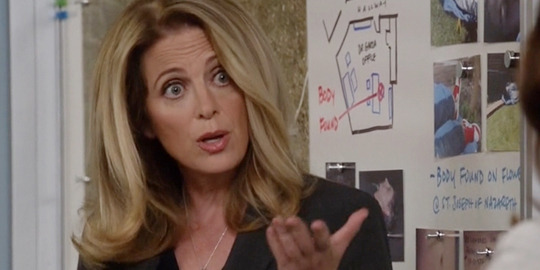
Andrea had just come back from Sharon's 80′s themed Bachelorette party.
Rusty talks up some lawyer shit and Sharon looks like a proud mama.
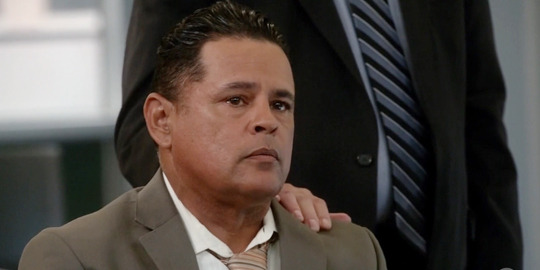
Julio is very sensitive AF (and yeah I'm slow because I JUST realized the reason why) and expresses his displeasure about calling Mateo's death a murder/suicide. If you can recall he was this touchy right after his brother was killed. Sadly with everything that's been happening in this arc I forgot that Julio's mother died. Love seeing the squad parents rally around him. Both Sharon and Provenza warn him that he's getting testy and he needs to cool it. Andy gives him a pat on his shoulder.
Buzz's mind starts working like Sharon's and suggest some sneaky ass bullshit to get around questioning the boys without lawyers. And Sharon looks like a proud mama.
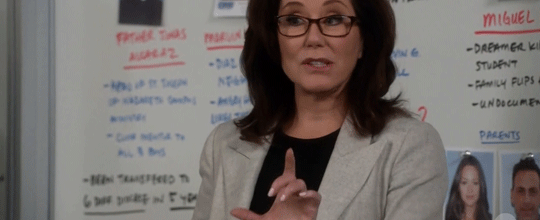
And Sharon talks about how small Jack was and is so happy that she's marrying Andy.
Ryan & Father Mother Lover "I want you to tell me exactly what you told Miguel. Word for Word." When this was first on, those words really struck at me. Because Andy said almost the exact same thing to Sharon in part4. Which really told me that shady Father Motherlover didn't kill Lucas or Mateo.
Questions that need answers: Here is where I am confused. I don't recall the boys ever describing what their attacker looked like. Either Dr Redmond hired someone to kidnap them or he was wearing a mask. Or the boys knew it was him all along and didn't want to tell the police/fbi what he looked like for whatever reason.
Couldn't the LAPD charge Father Mother Lover with crossing the boarder using someone else's identity? He used his brother's passport and admits to it on camera in an interview room. I feel like they should have charged him with that. But didn't because he was part of the church.
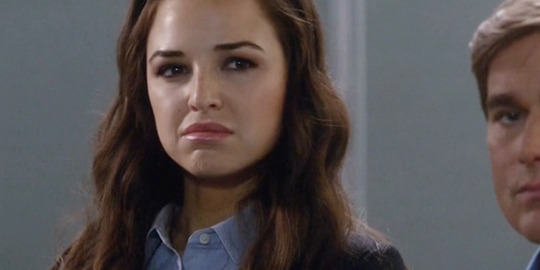
Why does Camilla have only one facial expression? She always looks like she's eating a sour lemon. Hey, I'm going to call her Sour Patch Kid from now.
The News Reels I've got some mixed feelings on them. I enjoyed them in the beginning. I think that at times they added to the hype, high profile and urgency in the Josephs 3. Not to mention helped push the political angles that were happening through out the case. You could really see some real life news channels, which reflect real life politics in our world.
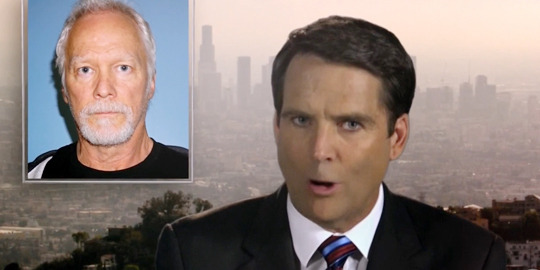
This guy is glorifying Marvin Garret while pushing Miguel's family to be deported back to Mexico. Fox news anyone?
But they happen far too often and after a while I just tuned them out. Your supposed to be listening to them and absorbing all of the different view points. And then they HAD to just add that last reel after the case was over. I get why they did it to give a short wrap up to what happened to all of the suspects, victims and witness's but seriously who even cares about what happens to these people? BECAUSE no one did. They are not the characters that we are emotionally invested in. That time could have been spent in a much better way by extending the too short wedding scene. I mean does anyone really care what happened to Bishop Calhoun?
Mending Fences (scenes full of gold)
There is a lot of mending going on in this episode.
FBI (Sharon, Provenza & The Squad) "I don't normally say this to local law enforcement but on behalf of the FBI, I apologize." Quite honestly I did not expect this. Please note that it was Fay that apologized not Vega. And what else I love about is Fay has prod Vega to tell the squad they were wrong and apologize himself. Also note that Fay says "I" while vega says: "we".
What actually happened:
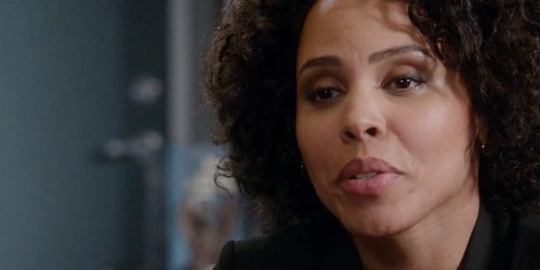
Mom: I apologize for being a bully.
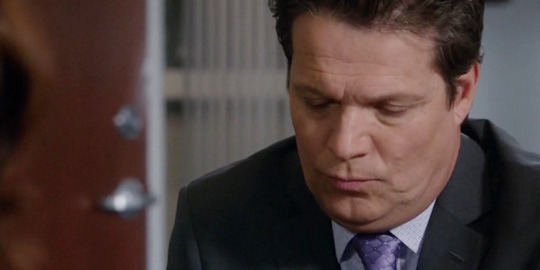
Son: I didn't do anything wrong. I'm not apologizing.
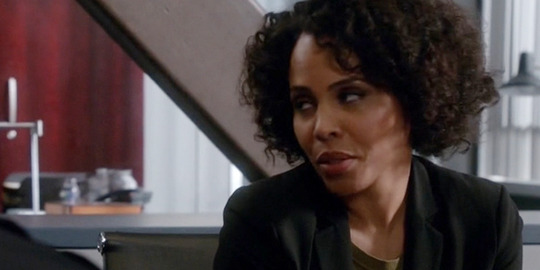
Mom: Say your sorry.
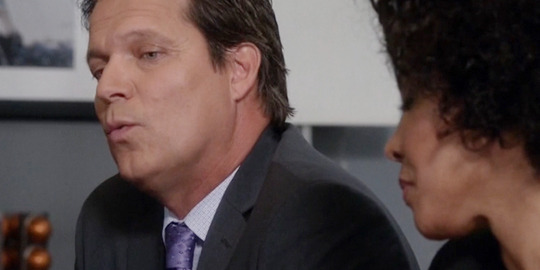
Son: mymomsaysihavetosayimsorry.we'resorry.
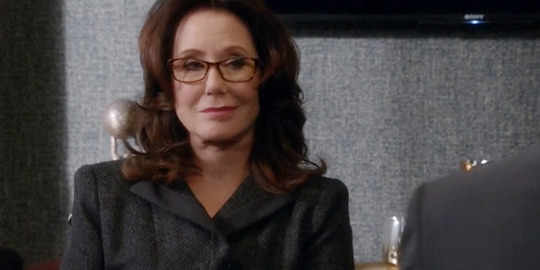
Sharon laughs at that pathetic excuse of Fay’s son's apology.
The Church (Sharon and Father Stan) "My worries are a lot to let go of."
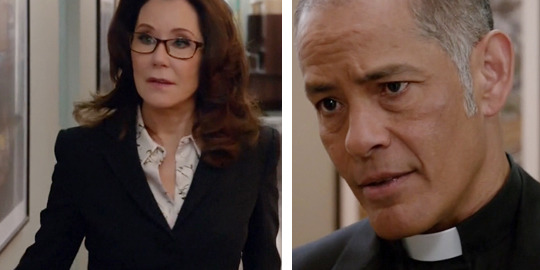
I just wanted to point out that Sharon is matching both Andy and Father Stan here. She's wearing that blouse from the infamous hug scene but we only managed to see a small portion of it. It's mostly covered up with a black blazer. Buttoned up which is kind of unusual for Sharon. And the way it's only showing from the neck up makes it look like the Priest's uniform.
I knew that there had to have been a scene between Sharon and Father Stan that would push their relationship back onto the road to recovery. I thought however that it was going to happen much earlier than it did. But it what an amazing emotional scene for Sharon. These two have had such a long history together. A very deep friendship that has lasted decades. And of course Sharon's crisis of faith during these episodes was not ever going to break. It would bend, in the way that it was supposed to but never break.
What's interesting to me is that Father Stan says he's been Sharon's Priest for 22 years. Which means that he became her priest after Sharon separated from Jack. Which makes me wonder if Sharon wasn't as devout of a Catholic until the crisis in her marriage. She says she's been a life long Catholic but that doesn't always mean a devout Catholic. Could the breakdown of her marriage pushed her to have a deeper faith than she did before? Or could this just be a case of Sharon changing Priests? We do know from what Ricky said that Sharon turned to the Catholic Church for support after Jack left.
"How are you feeling?" Sharon unloads her burdens onto Father Stan. We get another peak into Sharon's mind and her emotional state. And once again we are reminded of just how much Sharon really holds in. It really felt that she felt so much relief at unloading herself. And at finally coming to peace with her and Father Stan. With everything that's been going on with Sharon (emotionally and physically) these days. I'm sure it's been even harder for her to push through things without her normal councilor by her side. Father Stan has been her rock and has been with her through good times and bad. He is a definite source of support for her. He's probably one of the longest meaningful relationships she's had with someone other than her family.
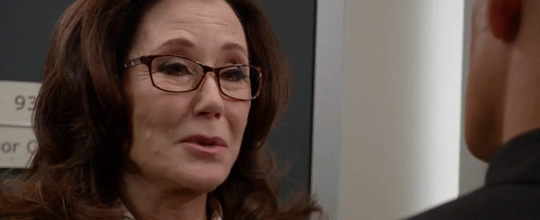
"Almost overwhelmed. Not by work or the wedding but my children are concerned about me and they express their fears to you. I can't..." Even when Sharon may die from her heart condition it is her family that is foremost on her mind. And the question that lingers there: "What will happen to them when I am gone?" And I love that Father Stan reminds her that is what faith is all about. To have faith that everything will turn out the way that it should. Whether she survives her illness or whether she dies from her illness.
The music really added to this scene! It was soft, sad and had gradual build up. Which really reflected Sharon's emotional state in this scene. From a quiet sadness building up to a more triumphant sound. Once Sharon is reminded about the purpose of faith, she's feeling more like her self internally.
My only nitpick about this scene is that as beautiful and emotional as this scene is. It really doesn't get a chance to breathe properly. Sharon shakes it off, goes right back to work and it's almost as if the moment didn't happen. And the scene cuts rather fast with a voice over from the next scene even before the shot is cut. I do understand that they pack A LOT in these episodes but sometimes moments (especially moments like these) really need some time to linger. In the way that I felt that the ILY scene from last week got a wonderful chance to breathe.
Moments from the Raydor/Flynn/Beck Family
I'm not sure why they filmed this scene from Rusty's perspective. It's a rather odd choice to make if you ask me because of how much we don't get to see. Their are some really awesome family moments that happen. And I love them all. Emily is an excited bean of energy, who seems to get her 'I love my family happiness' from Sharon. Not quite sure when the last time Emily came to visit (presumably it hasn't been three years). But Emily is just as excited about her mother marrying Andy as Ricky is. And I really love that. I had wondered exactly what Emily's reaction was going to be. I figured that it had to be happiness from her role in Sharon's annulment. Emily embraces Andy in a big hug and unfortunately we don't get to see it.
And there's this...
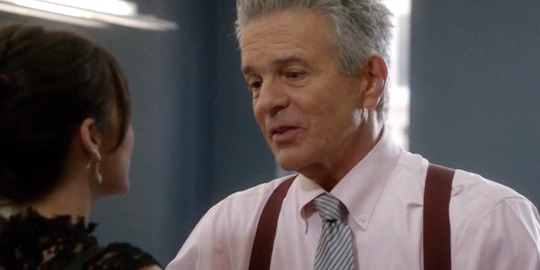
"This Marriage is the greatest honor of my life." JESUS FUCKING CHRIST! Please Emily tell Sharon that he said this.
And this...
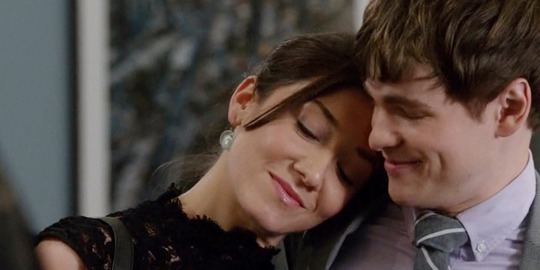
One adorable sibling hug that also hits you right in the feels. Through the years this family has FINALLY come together. And their a gigantic modge podge blend but they sure are happy to all be a family. I love how much love there is for everyone in this family.
The Past and Present Self
Sarah: Mateo, Lucas verses Dr. Alan Redmond "It wasn't like that." "I don't care what it was like. I want to know who."
Amy just doesn't give a shit here and I love it.
They parallel the Raydor/Flynn/Beck Family. The difference here being that everything that Andy, Rusty, Emily and Ricky do for Sharon. It is because they love her. Unlike with Alan. Who destroyed Sarah's life and killed her family because he thought that she would come back to him if her family was gone. The parallel is how little Alan knows Sarah. Verses how Emily and Ricky don't know Sharon's present self.
"All this trouble Doctor. Was it to get Sarah Garza back? Because Lucas freaked out when his mother brought up the idea of divorce and she left you? Do you think murdering her son and sprinkling Oxy everywhere would soften her heart?" Another little parallel. And while not in this particular episode. After Sharon divorced Jack, Jack thought that he'd get Sharon back by manipulating their son into dumping Rusty, showing up at her condo drunk, making her jealous with a french girlfriend. Manipulating information out of their daughter to later use against Sharon's boyfriend. Both men did not think of the damage they did to Sarah or Sharon's families.
Can we end this parallel for to talk about how Andy once again is drooling over his love while she procedes to go full Darth on Alan Redmond's ass. Quite honestly I think Andy has always been turned on by this. And yes even when she had that shit turned on him.
Sharon: Andy, Rusty verses Emily, Ricky (with Father Stan somewhere in the middle)
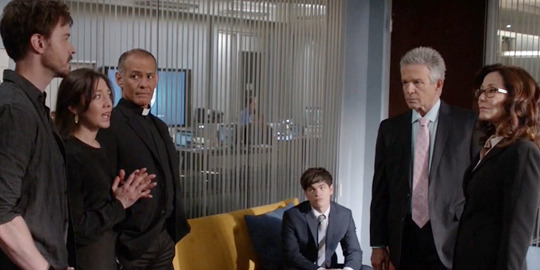
Look there’s a visual family divide.
The interesting thing about this scene and pretty much the rest of the episode. Is the division between Andy & Rusty vs Emily & Ricky. Someone around the fandom (and I wish I could remember who) had said that Emily and Ricky know Sharon's past. But Andy and Rusty know her now. That couldn't be anymore truer than here.
Emily and Ricky have gone through things with their mother and can explain things that Andy and Rusty may not understand. Such as Sharon's devotion to her faith. When Rusty asked Ricky why a church wedding was so important to Sharon. Emily and Ricky think they know and understand how their mother will behave baised on how she behaved when they were growing up. And while Emily and Ricky were off living their lives and following their careers. Sharon was growing as a person and living her own life. In that time she had a career change, adopted a kid, got divorced and fell in love. That is a lot to happen to a person in 6 years. Your life experiences and the people in them change you as a person. Even if Sharon wanted to be the same person she was when Ricky and Emily were kids. She's not.
Which brings us to Andy and Rusty. Who know, Sharon is now. They live with her and see her every single day. They know that pressuring Sharon to deal with something is not the way to go. Whether it is Sharon's illness or whether it's her wedding. Rusty knows this even before their plane's land which explains his "Oh damn it. When is Mom coming back?" to Buzz, when Ricky and Emily walk into the squad room. Andy catches up as soon as Ricky tells him to use him and Emily to lighten Sharon's load.
And Andy gives us this amazing look of quiet panic. Which I don't know about you but made me bust out when I saw this.
Andy has learned through years of their friendship and romance. That letting Sharon have her time to figure things out inside of her head is a much better way to go. To watch from a far and to be avaliable for her when she needs him. And to let her come to him instead of hovering over her. Because Andy is not a patient guy it must kill him to not push her into talking to him. But he gives her the space that she needs to think things through. Because he understands that's what she needs. While Rusty has absorbed more of Sharon's personality through the years and has just figured out himself that pushing Mom to do anything is a bad idea.
"She's taking her meds, she feels a lot better. Grab a chair. The adults have this. We really do." Love this line and how much this was about the dinner AND Andy telling Ricky that he and Sharon are taking care of her illness. Andy fathering the kids in a way we'd never see Jack father his own children.
We get another big dose of it in Sharon's office the day before the wedding right as they are closing their case. Emily and Ricky pressuring Sharon into dealing with the wedding is putting more stress on Sharon. Sharon eventually puts her foot down and says all I have to do is look great and walk down the aisle. In other words she's saying that she's got faith that everything will turn out just as it should. And she's choosing not to stress about it.
Father Stan is really the only person with a different perspective. As he as has known Sharon for decades and is still a confidant to her now. So he's got a wider perspective having known Sharon of the past and Sharon of the present. On the other hand which the very wonderful themagicm points out her podcast (seriously go check it out if you haven't) is that Sharon isn't really listening to her children. She very clearly sees that they are worried about her and that weighs heavily on her mind. But what she doesn't realize is that allowing them to help her will also help them deal with the implications of Sharon's illness. That they need to feel needed. So there is a very definite divide here and really neither party seems to be giving the other party what they need.
One thing is very clear is that every single person in that room has a massive amount of love for Sharon. And they are all doing what they think is best for her.
Sharon & Andy's Wedding
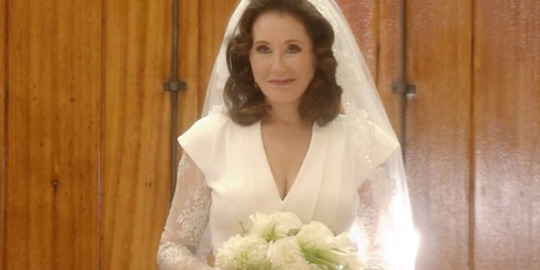
Much like everyone else it was much too short but it was absolutely gorgeous and there was so much stuff packed into this tiny little scene. Wonderful banter, lots of love (mostly happy, some not so much) and overall extremely emotional. Definitely a pretty epic moment for our couple and for the show. And also like with the proposal and the ILY, the wedding deserves it's own post. I'll be posting that soon.
What I don't like: The wedding was only three minutes long. I'm pretty sad about that. Ricky and Emily arrive at the squad room from Rusty's perspective. Now the problem isn't that it's from Rusty's perspective, the problem is that the scene starts while we are not seeing Ricky and Emily greet Andy but only hearing their voices. So we really miss out on seeing a giant smile on Andy's face at seeing them. Emily enthusiastically embracing Andy and maybe a fist bump between Andy and Ricky. At the end of the case. I think I agree with a lot of people that it dragged on for far too long. With a rather anticlimactic finish to the case.
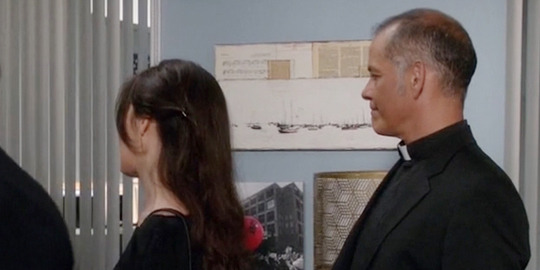
They've really gone overboard with this fishing/whale metaphor. If you were to look around Sharon's office you'd really think the woman has a huge love of fishing. When that's something that's NEVER been mentioned about her character. I really think that one piece of whale artwork and that Moby Dick book was enough.
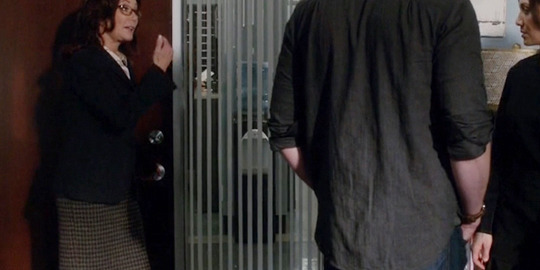
While we're on the subject of explaining things. Greg Lavoi can you please explain the wardrobe choice here? The shirt and the blazer -spot on. But that skirt doesn't even go with the rest of the outfit. Mixing plaid and a floral printed shirt? Could this outfit be all about Sharon's mental state and how fucked up it is right now? She's buttoned up and yet so mixed up emotionally. At this point that's where I'm going with it because it really doesn't go AT ALL.
What I like: While the wedding was very very short. What we did get was absolutely beautiful and it couldn't be more apparent that both Sharon and Andy love each other with their whole hearts. No matter how damaged their hearts maybe they are stronger together. Seeing the Raydor/Flynn/Beck family all together functioning as a family unit. I love all of the bickering, bantering, concern, love and happiness between all of them. I wasn't too crazy about the episode the first time I saw it but now that I have seen it a few times and am anaylising it. I must say that I'm seeing so many things in this episode. Particularly the personal storyline that I really love.
One thing I have yet to mention is the actor that plays Father Stan. Mark Damon Espinoza. In the instances of any extension of the main character's families. This show does an amazing job on casting family members. And I consider Father Stan a part of Sharon's family. Considering her very close relationship with him, one that she's had for decades.
Mary! Who the show may have forgotten that there's a reason why she's been nominated for Oscar's twice. But now we are FINALLY seeing the show actually use this wonderfully talented actress.
#major crimes#sharon raydor#andy flynn#shandy#a very shandy wedding#the wedding#sharon & andy's wedding#a reactionary post#mc season 6 a reactionary post
29 notes
·
View notes
Text
The Secret of Bernie’s Millions
New Post has been published on https://thebiafrastar.com/the-secret-of-bernies-millions/
The Secret of Bernie’s Millions
BURLINGTON, Vt.—Early on in his eight years as the mayor of this city, when he typically dressed in a tieless ensemble of work boots and corduroys, Bernie Sanders one day left City Hall and found a ticket on the windshield of his rusty Volkswagen Dasher. The offense: This was the mayor’s spot, and surely, a cop had thought, this was not the mayor’s car. But it was. It matched perfectly with both Sanders’ image as a scrappy advocate of the little guy and his own consistently shaky financial reality. It was the beginning of the 1980s, and he was approaching 40, a single father of a not-quite-teenage son, renting a sparse, second-floor apartment and having a hard time keeping up with his bills. “Not only,” he wrote on his yellow, coffee-splotched legal pads, kept in archives at the University of Vermont, “do I not pay bills every month—‘What, every month?’—I am unable to …” His scribbles in barely legible cursive in the margins read now simultaneously like reminders and afterthoughts: “gas,” “light,” “water.”
He was, said Bruce Seifer, a friend of Sanders, an economic aide in his administration and one of many people who know him who told me this, “frugal.” Seifer paused and considered the right way to put it. “That’s a nice way of saying he’s a cheap son of a bitch.”
Story Continued Below
Today, he might still be cheap, but he’s sure not poor. In the wake of his 2016 presidential run, the most lucrative thing he’s ever done, the 77-year-old democratic socialist is a three-home-owning millionaire himself—with a net worth approaching at least $2 million, taking into account his publicly outlined assets and liabilities along with the real estate he owns outright. In a strict, bottom-line sense, Sanders has become one of those rich people against which he has so unrelentingly railed. The champion of the underclass and castigator of “the 1 percent” has found himself in the socio-economic penthouse of his rhetorical bogeymen. This development, seen mostly as the result of big bucks brought in by the slate of books he’s put out in the last few years, predictably has elicited snarky pokes, partisan jabs and charges of hypocrisy.The millionaire socialist!
Sanders himself has been impatient to the point of churlish when pressed about this. “I wrote a best-selling book,” he told theNew York Timesafter he recently released the last 10 years of his tax returns. “If you write a best-selling book, you can be a millionaire, too.” Asked on Fox News if this sort of success wasn’t “the definition of capitalism,” he bristled. “You know, I have a college degree,” he said.
Based, though, on a deeper examination of his financial disclosures, his tax returns, property records in Washington and Vermont and scarcely leafed-through scraps of his financial papers housed here at UVM, Sanders’ current financial portrait is not only some stroke-of-luck windfall. It’s also the product (with the help of his wife) of decades of planning. The upward trajectory from that jalopy of his to his relative riches now—as off-brand as it is for a man who once said he had “no great desire to be rich”—is the product of years of middle-class striving, replete with credit card debt, real estate upgrades and an array of investment funds and retirement accounts.
As an immigrant’s son who started close to the bottom and has ended up nearer to the top, Sanders has a narrative arc that would form the backbone of the campaign story of almost any other candidate. But it’s more complicated for him. There’s never been anybody like Sanders in the modern political history of this country—somebody who made a career out of haranguing millionaires … and who is now a millionaire himself. There is no set strategy for how to run for president as a democratic socialist with an expensive lakefront summer house. Americans generally don’t begrudge millionaires their millions—and, as Donald Trump has confirmed, the aura of wealth can serve as a useful means of self-promotion—but what to make of Sanders’ apparently conflicting narratives?
“He became the very thing he criticized others for becoming and at the same time didn’tfixany of the problems he’s been railing about that got him to this point,” Boston-based Democratic strategist Mary Anne Marsh told me.
“He almost at times sounds like he thinks it’s inherently evil to be well-off,” veteran Democratic strategist Bob Shrum said this week in an interview.
Does all of this make Sanders’ abiding calls for economic justice more authoritative or compelling, especially as the ranking member of the Senate Budget Committee argues on the 2020 hustings for costly programs like tuition-free college and universal health care, or does it defuse his drilled-home political brand and somehow muffle his message?
“I think it’s only awkward if someone has sort of a facile understanding of what Bernie is trying to accomplish,” senior Sanders adviser Jeff Weaver told me, “which is to give lots of people opportunities to have a modicum of security.”
“It depends on how it plays out,” Shrum said.
What’s certain, though, is that how Sanders has become wealthy, and how he has managed his money, is one of the least radical things about the self-identified radical Sanders.
***
Before he had three homes,Sanders grew up in a rent-controlled apartment with three and a half rooms. The national economy boomed in the years following World War II, but in Sanders’ corner of the Flatbush section of Brooklyn, New York, life meant cut-rate groceries and hand-me-down coats.
His parents, a Polish paint salesman and a homemaker, were “solidly lower-middle class,” as he once put it, and they argued frequently about money—“arguments and more arguments,” Sanders has said. “Painful arguments. Bitter arguments. Arguments that seared through a little boy’s brain, never to be forgotten.” There was some talk at the outset of his second presidential candidacy that Sanders now was reluctantly ready to share more of his personal past, but this at least is a piece of it he’s been talking about for as long as anybody’s been listening to him and writing it down. “Money was a constant source of anxiety,” he said to a reporter from theWall Street Journalin 1983. “Money was something the family, the whole neighborhood, was constantly preoccupied with,” he toldThe Atlanticin 1985. “The money question to me,” he said in 2010, in a book calledThe Jews of Capitol Hill, “has always been very deep and emotional.”
Sanders’ mother died when he was 18, and his father when he was 20. He got “a few thousand dollars” of inheritance. And for $2,500, the summer after he graduated from the University of Chicago, he and his first wife bought 85 acres of meadow and woods in Middlesex, Vermont, an out-of-the-way plot that came with an old maple “sugarhouse.” With no electricity or running water, life in the ascetic, dirt-floor, shack-like structure didn’t work out, and neither did his marriage.
Toward the end of the ‘60s and throughout the entirety of the ‘70s, as he ran twice for governor and twice for the United States Senate as a member of the anti-war, left-wing, little-but-loud Liberty Union Party, Sanders worked sporadically as a carpenter and a freelance writer and eventually made and sold to schools filmstrips about largely regional history. “He was always poor,” friend Sandy Baird told me. Sanders collected unemployment during one of his political campaigns, borrowed gas money for his battered beater of a VW bug and dangled extension cords to share electricity with a downstairs neighbor. He got evicted. He didn’t seem to those around him to be too worried about it. “Everyone has to make sure that they survive, so obviously money was a concern,” remembered Linda Niedweske, a nutritionist at the time who got to know Sanders and later would become a political aide, “but it was never an overriding goal.” Fellow pal Dean Corren agreed. “I don’t think he ever really worried about that on a personal level,” he said.
“He didn’t give a shit about clothes,” said Tom Smith, a progressive activist and former city councilor. “He didn’t care about his car.”
In this respect, according to local attorney John Franco, a longtime confidante who’s known Sanders since the ‘70s, he fit in with many of the congenitally parsimonious citizens of his adopted home. And it’s more than even that, Franco added. It’s not just that he didn’t and doesn’t want to spend money. “He doesn’t want to bebothered.”
Sanders also used his meager means to buttress his political aims, wielding it almost as a kind of authenticator for the crux of his lodestar view of the haves and have-nots. He lambasted “a United States Congress composed of millionaires.” He said again and again that it wasn’t right that their elected representatives appeared in his estimation to disproportionately serve “the interests of corporations and big business—their fellow millionaires.”
In 1974, waging one of his quixotic campaigns for the Senate, he practically ran more against Nelson Rockefeller than he did his actual opponents. And in 1976, in releasing his financial disclosure as a candidate for governor, he attached a short statement that sat on the page actually not like an apology so much as a chest-out boast. “Unfortunately,” he said, “there is not too much to report. At the present moment, I am ‘worth’ about $1,100, which includes a savings account and a 1967 car. I own no real estate, stocks or bonds.”
This steadfast posture got necessarily more locally focused when he ran for mayor starting in the fall of 1980. As the election of Ronald Reagan ushered in nationally a more conservative, pro-business age, Sanders prioritized tenants’ rights, pledged no hikes in property taxes and promised a “people-oriented” waterfront instead of an enclave of high-priced condominiums. “It is my belief, if present trends continue,” he wrote in a crinkled newsprint pamphlet tucked in the UVM files, “the City of Burlington will be converted into an area in which only the wealthy and upper-middle class will be able to afford to live.” He knocked on door after door in the cold in the city’s poorer wards.
“Not having money, he was able to identify with these people,” Garrison Nelson, a Vermont political science professor and veteran Sanders watcher, told me, “and they were able to identify with him.”
“He would walk into a home where people were fairly poor,” said former city councilor Gary De Carolis, “and he’d be absolutely right at home.”
He won by 10 votes. His new job came with a yearly salary of $33,824, plenty hearty at that time, the equivalent of more than $100,000 in today’s dollars and easily more than he had ever made. “It’s so strange, just having money,” he marveled to a reporter from the Associated Press.
Nearing a year into his tenure, he bought a new car, a silver Honda Civic station wagon—paying $6,400 and taking out a three-year loan, committing to monthly payments of $239.69, according to records of the transaction in his files. After three fender benders, he would come to regret the splurge. “I knew I should never have bought a new car,” he toldNew England Monthly.
And shortly after his first re-election, in 1983, perhaps feeling a smidge more secure and emboldened, he finally stopped renting. With a mortgage of $49,500—records don’t show what he put down, or the total price of the sale—he purchased a two-story, six-room, 1,900-square-foot house on Catherine Street, a mile south of City Hall. The décor remained spartan. “Not a whole lot of furniture,” De Carolis recalled. Even so, and even then, the fact that the socialist mayor owned justonehome caused some critics to tut-tut. “I can remember lefties criticizing Bernie when he bought his first house,” Franco told me, their suggestion, he said, “that he was a bourgeois sellout when he didthat.”
***
“My political philosophy,”Sanders penned in one of his legal pads, underlining his mid-‘80s chicken scratch.
“Ultimately, I believe in democracy—that we should live in a society whereallof our citizens help decide what happens—and whereallof our citizens enjoy the fruits of their labor. In practical terms, the development of a democratic society in our nation would mean a far greater degree of citizen participation, public ownership of production, and a far more equal distribution of wealth and power,” he said.
“Essentially,” he continued, “I believe that 200 people years after the 1st American Rev.—we need a 2nd American Revolution.”
In these private writings, he returned to this theme regularly.
“There is a great deal of confusion in this country as to what politics isreallyabout,” he said. What it wasn’t about: ads, TV, how a candidate looks, “inane debates between Dems and Reps, saying the same thing.” No, he said. “In politics, there are winners and losers,” and the losers, Sanders believed, were “the majority of our population who work hard—day after day, year after year—and often have nothing in the bank to show for their years of efforts.”
Those were the people he sought to represent.
“My view of politics,” he wrote elsewhere in his notes, “is that you can’t always represent everybody. Which side are you on? The Class Issue is the major issue.”
When he was mayor, the monomania of Sanders’ theory and rhetoric didn’t change, obviously—but something else about him definitely did. Because in retrospect, a step toward improving his personal finances in some sense was stabilizing the city’s.
Surprising skeptical and even fearful local businessmen, surprising both Republicans and Democrats on the city council, surprising his friends and many say even himself, “Hizzoner the socialist,” as theBoston Phoenixcalled him, proved to be a diligent and able steward of the municipal purse. “He’s not a spender,” Peter Clavelle, one of his top economic staffers who ultimately succeeded him as mayor, told me. “He was in fact a fiscal conservative that managed the city’s resources quite well.”
With the help of a savvy treasurer in accountant Jonathan Leopold, Sanders found an unexpected surplus of $1.9 million, which he used to pave roads without hiking taxes. Putting out to bid the city’s fuel and insurance contracts, instituting the first audit in nearly 30 years of the city’s pension fund and streamlining cooperation between different departments, he saved hundreds of thousands of dollars. He upped fees for large-development building permits. He raised taxes on commercial properties, but opponents’ ads saying Sanders “does not believe in free enterprise” fell flat. From his third-floor office, with a Eugene Debs poster hanging on the wall—“Unionist. Socialist. Revolutionary,” it said—he launched an economic task force that led to the creation of the Community and Economic Development Office. “It is my view that there is probably no more important area of concern for the City of Burlington than the issue of economic development,” he wrote in announcing the endeavor.
“The Republicrat administrations were acting just like a big corporation,” Sanders said in 1982 in an article in New York’sIthaca Times, emphasizing his conviction that there was little difference between the two major parties. “They were sluggish, without motivation or ideas. We had the good fortune to inherit that moribund system and revamp it.”
“Socialist Mayor Presides Over a Spell of Prosperity,” read a headline in theHartford Courantin 1985.
City staffers sometimes claimed that Sanders was “out-Republicaning the Republicans.”
“Trotskyites for Sound Fiscal Management,” they joked.
The “red mayor in the Green Mountains,” asRolling Stonehad dubbed him, was reelected the first time around with 53 percent of the vote, and then in 1985 with 55 percent, and then in 1987 with 56.
If he wanted to talk about what he really wanted to talk about, which was income and wealth inequality and the burgeoning American “oligarchy” as well as foreign policy, he knew, say his advisers and friends, that he first and foremost had to get right the dollars and cents. “If he did a good job there,” De Carolis said, “then he could talk about what’s going on in Nicaragua. But he couldn’t talk about the inequalities of various parts of our country if he didn’t take care of that home front.”
He was, Bill Conroy wrote in the 2016 preface to his 1990 book about Sanders that started as his doctoral thesis in the ‘80s, a “pragmatic socialist.”
“Bernie himself may or may not have been a good financial manager,” Steven Soifer told me. Now the chair of the Department of Social Work at the University of Mississippi, he is also the author of a 1991 book on Sanders’ time as mayor. “However,” Soifer said, “Bernie always had the skill of surrounding himself with very competent, sometimes brilliant people.”
One of them was Bruce Seifer, a higher-up in the Community and Economic Development Office, or CEDO. “It’s about fairness and democracy with a small ‘d,’” he told me. “You run government effectively and efficiently, number one, and then you make sure that everybody does the job they’re supposed to do, and everybody pays their fair share of taxes.” But Sanders was at the helm. “And the thing is, he’s not a radical,” Seifer said. “He’s just, like, your common sense uncle.”
***
Looking back,the last two years of the ‘80s can be seen as the start of the rest of Sanders’ life—because that was the moment when he really started using traditional tools of the country’s capitalist financial system to put himself on firmer footing.
In May of 1988, he married the former Jane O’Meara Driscoll, a divorced mother of three who had been his significant other the entire time he was mayor while also serving as the director of his administration’s youth office. And that summer and fall, nearing the end of his fourth and final term at City Hall, he ran for Congress, as an independent, of course—and lost. But he lost only by 3.7 percentage points, and he beat the Democrat, effectively becoming for the first time in his career a realistic electoral option in a statewide race. “A real breakthrough for him,” Nelson, the UVM professor, told me. It was a hint of what was to come.
At the time, though, that’s all it was—latent potential in a moment marked more by unknowns and unease. Biding time and weighing his options, Sanders scrambled for paying gigs. In January of 1989, he contacted the chair of the sociology department at Hamilton College, four hours away in Clinton, New York. “I believe,” Sanders wrote to Dennis Gilbert, “that I could offer your students an unusual academic perspective.” After spending a semester as a fellow at the Institute of Politics at Harvard’s Kennedy School of Government, he taught classes on urban sociology and social democracy at Hamilton. Leaning on the last hunk of his salary as mayor and speeches at colleges and universities, Sanders made more than $45,000 in 1989—given inflation and the rising cost of living, effectively less than he had made when he was first mayor. Staring at 50 and mulling another crapshoot of a congressional bid, he fretted. “At Hamilton,” Steve Rosenfeld, his 1990 press secretary, would say, “Bernie would often confide in Dennis, saying he was worried about his professional future and financial security.”
Sanders and his new wife responded by pooling resources. Central to their efforts? One of the most reliable ways that millions upon millions of Americans have used to leverage and try to improve their financial fortunes: real estate.
In September of 1988, according to local property records and kicking off a spate of activity, Jane Sanders changed the house she owned on Isham Street to a housetheyowned—shifting legally from “sole owner” to “Jane O’Meara Sanders and Bernard Sanders, husband and wife, as tenants by the entirety.” Just two days later, together, they used the house to take out a mortgage of $50,000. The following February, according to a three-line recording of the transaction in theBurlington Free Press, Sanders sold the house he had bought in 1983 with a $49,500 mortgage for $82,000—a fine return on that first investment. Not quite three months later, leaving the more “urban” portion of Burlington and moving to a neighborhood closer to picturesque Lake Champlain, Bernie and Jane Sanders got a $140,000 mortgage to purchase for $175,500 a three-bedroom, two-bathroom, not-quite-1,600-square-foot house on Killarney Drive—“a red-paneled, boxy, split-level house,” as Rosenfeld would describe it, “that could be in any middle-class suburb in America.” Barely more than a month after that, they sold the house on Isham for $135,000.
In 1990, sometimes wearing a blue blazer with a missing button, working out of a cramped basement office in the Killarney house that had plywood tables, a painted-shut window and green, glued-on, indoor-outdoor carpet, and getting into hot water in the press for paying his staffers as contractors instead of full-time employees, Sanders tried again to win Vermont’s sole seat in the House—and this time did. In the aftermath of his victory, he was a mixture of exultant and indignant. “I’m not an insider,” he said. “I know who I am. I know where I came from. I don’t need to get down on my knees and ask rich people for help.” After having excoriated members of Congress for voting themselves pay raises two years before—“quite beyond comprehension,” he huffed in a letter he wrote to the three members of Vermont’s congressional delegation that he made public with a mayoral press release—Sanders started making considerably more than he had ever earned: $125,100 a year.
In the first half of the ‘90s, though—as the crotchety independent butted heads with Democrats in Washington while attempting to navigate the topsy-turvy political terrain of the time, the election of Bill Clinton spawning the rise of increasingly virulent, Newt Gingrich-led hyper-partisanship—Sanders’ prospects were far from assured. And he used his house to hedge his bets. Signing over power of attorney to his wife, they refinanced in 1991 and then again in 1993, both times with mortgages larger than the one they had agreed to in 1989—$140,500 in ’91, $145,600 in ’93.
Sanders settled in, though, as a more and more fixed political presence in Vermont. His race in ’94 was the last one he could have lost, really, as he cemented his status and security.
In 2000, with a real estate boom underway, and with a mortgage of $62,100, he and his wife bought in essence their first second home—a condominium in Burlington, which they bought initially for Jane Sanders’ elderly mother, according to Weaver, and used intermittently as a place for extended family or a rental property.
In 2004, Jane Sanders was hired as the president of Burlington College, a small, middling liberal arts school. Making a six-figure salary of her own, her tenure would end in acrimony, after her decision to pursue a campus expansion by making a $10-million land purchase crippled the institution. She resigned in 2014 and took with her a $200,000 severance some called a “golden parachute.” In 2016, the debt-beset college closed for good, felled by “an inexperienced president,” in the barbed words of Jane Sanders’ successor.
In the meantime, Bernie Sanders’ career was heading in the opposite direction—up. In 2006, he was elected to the Senate. In 2007, with his congressional salary now at $165,200, and adding to the condo and the house on Killarney, quietly climbing some financial stairsteps when far fewer people were paying him any attention, Sanders bought at the top of a surging real estate market a row home in Washington for $489,000.
And in 2009, with markets crashing, when half of the 100 senators still were worth a million dollars or more, Sanders’ estimated net worth clocked in at $105,000, according to the Center for Responsive Politics—at the bottom of the Senate wealth chart. Back in Burlington, Bernie and Jane Sanders returned to real estate, using a mortgage of $324,000 to purchase for $405,000 an upgrade—a four-bedroom, 2,352-square-foot house that sits atop a slow slope of a hill up from the street on Van Patten Parkway. (They bought the house, interestingly, from her son, David Driscoll, and his wife. In 2012, for $265,000, Driscoll and his wife bought from Jane and Bernie Sanders the Killarney house. Effectively, they swapped houses. Driscoll, Weaver said, wanted to live in “his childhood home.”) In 2013, Bernie and Jane Sanders refinanced the Van Patten house, taking out a mortgage of $312,275.
And in 2015, when he started running for president, he had a net worth of a little more than $700,000, according to CRP calculations, a financial picture that had all his assets in his wife’s name and liabilities from a pair of mortgages as well as credit card debt he listed as between $25,002 and $65,000. It made him, a spokesman said at the time, “a regular American.” More “regular,” perhaps, than he should have been: According to the Federal Reserve, the average household in 2015 had credit card debt of about $10,000.
“Unfortunately,” Sanders said during his 2016 campaign, using the same effacing opening clause and striking the same tone that he had in his financial disclosure of 40 years before, “I remain one of the poorer members of the United States Senate.”
But for the politics he practiced—always—it was a useful note to sound.
He all but compared his finances to those of the frontrunning Hillary Clinton, she of the high-dollar speaking fees. “That type of wealth,” he said, “has the potential to isolate you from the reality of the world.”
It wasn’t long before unprecedented money for Sanders started rolling in.
***
Driving from address to address, I recently made a quick, self-guided tour of Sanders’ sequence of houses here in the Queen City of Vermont, tracing from Catherine to Isham to Killarney to Van Patten the almost 40 years of the socialist’s slow climb to the upper class. I stared at his car, a red 2010 Chevy Aveo, parked in his driveway.
Then, though, I carried on an hour so north, to bucolic North Hero, some 20 miles south of the Canadian border, to see the emblem of the economic altitude to which Sanders has ascended—the third house, the summer house, the house with rustic wood sides and a silver tin roof and four bedrooms and 500 feet of waterfront that Bernie and Jane Sanders bought for $575,000, cash, through an entity they created called the Islands Trust. “Jane’s idea was to have something that would stay in the family,” Weaver told me, “over generations, and that sort of structure was the way to help accomplish that.”
Past horses and silos and campsites and apple farms, it’s nestled at the end of a gravel private lane, hidden behind a cluster of evergreens, looking out over the wide, resplendent blue of Lake Champlain.
Much has changed in these last four years. In 2015, Sanders had that credit card debt and two mortgages that ranged from $250,001 to $500,000, according to his Senate financial disclosure of that year. In 2016, the credit card debt was gone, and one of those mortgages had been halved. By 2018, only one of the mortgages remained at all; that January, records show, he paid off what was left of the $312,275 mortgage he had on his main house in Vermont.
In 2015, he published a book calledThe Speech, basically a transcript of his memorable 2010 filibuster on (what else?) corporate greed, income inequality and the decline of the middle class. Sanders made $3,035, which he donated to charity. In 2016, though, book money began to pile up. He got a $795,000 advance to writeOur Revolution. He pocketed an additional $70,484 in royalties. In 2017, the book royalties added up to $880,091.14. And last year, while they dipped, they still were a hunk of money: $392,810.37.
The Sanders’ tax returns, too, tell the tale: From 2015 to 2018, their total income went from $240,622 to $1,073,333 to $1,150,891 to $566,421. Some of that, along with money from a retirement account, according to Jane Sanders, plus proceeds from a sale of a share of a family home of hers, helped pay for the nice place on the lake that I sat and looked at while listening to birds chirp in the chill of spring here in the northern reaches of New England.
“Bernie is a known quantity in any socialist paradise,” GOP consultant Rick Wilson told me, “the party apparatchik with the dacha …”
This kind of characterization makes Sanders’ friends and others who’ve known him for years all but roll their eyes.
“He’s still the same cranky guy,” said Terje Anderson, the chair of the Vermont Democratic Party. “I run into him at Hannaford shopping for groceries.”
And in his cart, I asked, aren’t the finest meats and cheeses?
“Hell no,” Anderson said.
“There’s no change,” Niedweske added. “His priorities remain the same.”
“I mean, I don’t think any of Bernie’s supporters said, ‘Oh, well, now that he’s made a lot of money selling a book … I can’t support him anymore,’” Terry Bouricius, a former Burlington city councilor and progressive who’s known Sanders since the ‘70s, told me. “No—I don’t think that happened to anybody.”
A spectrum of politicos I talked to don’t think this is that big of a political problem for Sanders. He has problems, actually, they said, that are bigger than his bottom line—his persistent lack of appeal to female voters and black voters, for instance, and his generally sagging poll numbers ever since an evidently formidable Joe Biden entered the race, and the slap-in-the-face mathematical fact that this time around he’s running against not only Hillary Clinton but 20-plus other Democrats. He is, in other words, no longer the beneficiary of the anybody-but-her voters.
“The least of his problems,” Marsh, the Democratic strategist from Boston, said of his wealth.
“Detractors will needle and pester and continue to push that argument,” said Joe Trippi, the Democratic strategist who’s been working on presidential campaigns for almost 40 years. “But I don’t think in the end it’s going to have much impact.”
“On the list of stuff that bothers me about Bernie,” said Stuart Stevens, the GOP consultant who was the chief strategist for Mitt Romney’s 2012 run, “the fact that he wrote a book and made some money doesn’t bother me at all.”
Ditto Democrat Bakari Sellers.
“I’m not going to sit here and shit on Bernie Sanders for being a millionaire,” the former South Carolina lawmaker and current Kamala Harris supporter told me.
Why not?
“I want to be a millionaire, too!”
Read More
0 notes
Text
English Translation of 日本語 wikipedia of Inada Tomomi
Tomomi Inada (Tomomi Izoda, February 20 , 1959 ) is a Japanese politician and a lawyer . The maiden name is Tsubakihara . Members of the House of Representatives belonging to LDP (4th term), Minister of Defense ( 15th generation), LDP Fukui prefecture adviser.
Minister in Charge of Regulatory Reform of the Cabinet Office, Minister in Charge of National Public Service System, Liberal Democratic Party Political Investigation Chairman (56th), and Liberal Democratic Party Fukui Prefectural Chairperson.
History
Career as a lawyer
1959 - Birth as a daughter of Yasuo Tsubakihara in Imachi-cho , Imazu-gun, Fukui Prefecture
March 1977 - Graduated from Kyoto Prefecture Odori High School
March 1981 - Graduated from Waseda University Faculty of Law
1982 - passed the bar exam
1983 - Judicial apprentices (37th period, in sync with Shingo Nishimura , Kazuo Nakamura , Makoto Anza and husband's Inada Ryukei also synchronized .)
1985 - Attorney Registration ( Osaka Bar Association , Fukui Bar Association since December 2008 )
1989 - Marriage with lawyer Inada Ryukei
1990 - Tax Accountant Registration, Working at Nishi Umeda Law Firm
2004 - Inauguration of Lawyer corporation Gwangmyeong (Osaka-shi Kita-ku) inauguration
This representative inauguration was stated in the election gazette at the time of the first prize. In response to a question from the opposition at the House of Councilors Budget Committee on March 8, 2017 which originated from Morihan Academy 's state-owned issue, he answered, "I have never been a representative." Then, at the same committee on March 15, Democratic Progressive Party Hidena Sugio asked for contradiction with the description of the election bulletin, "At the beginning of the establishment of the corporation in December 2004, the employee was established with two employees, Because of law enforcement each lawyer is representative of the association, I wrote it as representative. "The election ceremony is not an error," and since I changed my company's articles of incorporation in 2008, my husband was made a representative employee I decided to offer corrections. " [1]
History of becoming a politician
While I was enrolled in law school at Waseda University , I did not have an equal employment opportunity equal law at that time at the time and I had little employment place, so I thought to take a bar exam. After studying for about 16 hours a day and passing the bar exam, becoming a lawyer I mastered the work of law as a hired attorney of a law firm for five years but I stopped being a child. At that time, the husband was reading " Sankei Shimbun " and "justice" so Inada gradually began to read and eventually began to post such posts as "Current education is strange" and so on. Later, Mr. Katsuhiko Takeda, a lawyer, can call out "I will not trial with Nanjing case" on the phone. The person himself wrote the feeling at that time as "the Tokyo Shimbun newspaper, the current Mainichi Shimbun wrote in the warfare elevation [of the" hundred slash competition "at the time of the Nanjing incident ] the lie article became the only evidence, the postwar Nanjing Two executives of BC class war criminal of military trial of [ Captain Tsuyoshi Noda and Toshiaki Mukai written as competing] were executed. Totally lying, I think that I can not leave the current situation that it is being disseminated as a true matter as it is taught in textbooks as to hurt the honor of Japan " [2] and Says. On the day of the final argument, I met Mikai Mukai's second daughter Mukai Chieko , and I am impressed by seeing women fighting alone. As a result of this, the lost professor Noda and the survivors of the lieutenant Mukai Mukai opposed the " Mainichi Shimbun " " Asahi Shimbun " Honda Katsuichi and others, causing a trial of defamation. Inada said, "I was not interested in politics at all, but I thought that I wanted to manage the situation that Japanese honor was damaged by lies." Just two weeks before the dissolution of the postal service , the LDP headquarters has the opportunity to give a lecture on the contents that "the 100-man slash competition" is a cookie, which remained in the eyes of Shinzo Abe 's acting secretary general, who was audited, to the politicians It was decided to be scouted [2] .
Political history
2005 ( Heisei era 2005 )
2006 (Heisei era 2006)
2007 ( September 2007 ) September - Liberal Democratic Party presidential election , Kiyomasa laboratory affiliation Members of the National Assembly affiliated with the Seiwa Laboratory, the eldest son of Fujita Takuo, the founder faction only, supports Association Liberal Father Yasuo Aso instead of Aso [ Required source ]
2008 ( September 22) September 22 - Liberal Democratic Party presidential election , Aso 's nominator is named [8] .
2009 (Heisei 21)
2010 (Heisei 22)
2012 (Heisei 24 years)
2014 (Heisei 20 years)
2016 (Heisei 28)
On August 18 - Prime Minister Junichiro Koizumi requested to run a general election from the Fukui 1 ward as a candidate for " thugus " to Member of the House of Representatives Isao Matsumiya who was opposed to the postal privatization bill at the LDP headquarters , Acceptance ( requested by Shinzo Secretary General Shinzo Abe three days ago) [3] . Formal announcement of the candidacy on the 21st [4] .
September 11 - First election at the 44th House of Representatives' Parliamentary Election (Fukui 1st District - Liberal Democratic Party official recognition). 51,242 votes. It was 373 votes from Rds. Sasaki Ryuzou, the Democratic Party's former job leader . Liberal Democratic Party has adopted a female candidate as a proportional upper preferential treatment in this general election [ Citation needed ] , Inada also was ranked second in rank higher than other overlapping candidates in proportional Hokuriku Shin-etsu block [6] .
September 20 - served as candidate filing party together with Mr. Matsumoto with his name on the Aso 's nomination list in the LDP presidential election [7] .
August 30 - Reelected Sasaki in the 45th House of Representatives general election (Fukui 1st district · authorized by the LDP). 72,639 votes [9] . In this election, only Inada broke the Democratic candidate 's incumbent candidate in the small constituency (1 ward) with the prefectural office's location [ need for verification - note ] [10] .
April 6 - Liberal Democratic Government Power Committee ( Sagaki Tanigaki ) Cabinet of Shadow Headed by Liberal Democratic Party Governor ) Social Capital · Network Improvement · Information Communication Deputy Supervisor (Abolished September of the same year) [ Required source ]
September 22 - Liberal Democratic Party Shadow · Cabinet Deputy Minister of Justice [11] .
September 26 - Liberal Democratic Party presidential election, will be nominated as a nominee for Shinzo Abe .
December 16 - 3 elections in the 46th House of Representatives' general election (Fukui 1st district / LDP official recognition). 68,027 votes [12] .
At the same time, administrative reform [13] , civil servant system reform [13] , re-challenge [ 13] , re-challenge [ 13] , cabinet ministerial affairs of the second Abe cabinet , 13] , Cool Japan strategy [13] and so on, respectively .
May 30 - Minister in charge of the National Public Service System [14] .
September 3 - 56th Liberal Democratic Party political investigation chairman
December 14 - Four selections in the 47th House of Representatives' general election (Fukui 1st district / LDP official recognition). 116,855 votes [15] .
In the ministerial personnel affairs of the 3rd Abe 's second remodeling cabinet , he took office as the Defense Minister [16] .
Biography as Minister of Defense
2016 (Heisei 28)
August 15 - We visited Djibouti in the eastern part of Africa where the SDF is stationed for coping with piracy, encouraged its members, and then President Ismail Omar Gueret , Ali Hasan Burdon ( French version ) We met with defense minister respectively [17] . This will be the first foreign tour as the Minister of Defense. In addition, as a result, visits to the Yasukuni Shrine on the war of the end of the war have been postponed due to this excursion [18] .
October 8 - David Yau Yau ( English version ) Meeting with Deputy Defense Minister of Defense and Ellen Margrette Roy ( English version ) with the Special Representative of the United Nations Secretary General and then serve as the captain He inspected South Sudan dispatch facility troops etc. (the tenth staff), exchanged opinions on the living and activities of the men in the field, as well as taking care of the family members who left in Japan We encouraged our members [19] .
December 29 - Although the worship of the Yasukuni Shrine on the end of the war was being postponed, I worshiped on this day [20] . In addition, Prime Minister Shinzo Abe, who had returned from Pearl Harbor visit this day, took a "no comment" on this matter.
Policy / thought belief
Tomomi Inada (2016) History view Class A war criminal and war responsibility
The Tokyo Tribunal ( Far East International Military Tribunal ) that regulates Class A war crimes in connection with the Yasukuni Shrine visitation problem is a violation of the international law in a dual sense in violation of the Potsdam Declaration and the principle of modern law (the criminal justice principle) The Tokyo trial states that it is the center of the "occupation policy" and "postwar system" and can not rectify the distortion of the postwar system without overcoming the Tokyo court historical perspective. He also stated that it was not a simple thing that Japan entered a reckless war and was defeated because there was a Class-A war criminal, and that responsibility can not be attributed only to Class A war criminals. [21] . In February 2015, he said, "We should have the attitude to verify the authenticity by ourselves" [22] .
About a 100-man slash competition
It takes a stand that it did not actually have a competition slashing 100 people [23] .
In the lawyers' era, the bereaved families of the two former Japanese army executives who executed as a 100-man slash competition sued the Asahi Newspaper , Mainichi Shimbun and Honda Katsuichi , filed lawsuit seeking damages for injury and injunction ( 100 people Participated as one of plaintiff agents on slashing competition # defamation trial ) [24] . Inada thought that it was able to prove that the 100-man slaughtered as a symbol of the Nanjing massacre is false [24]] , but the plaintiff's claim by the Supreme Court has been dismissed [24] . By losing a trial, I felt the limits of my activities as a lawyer, and I'd like to work from political places [24] . "We want to protect the honor of bereaved families and the country by properly refuting what is different from the facts, and we can balance our friendship between Japan and China" [24] .
Yasukuni Shrine
He insisted that there is no causal relation between the A-class war criminal enshrination at Yasukuni Shrine and Emperor Showa's cancellation of worship. At the meeting hosted by the Japanese Council at the Yasukuni Shrine on August 15, 2006, he proposed advocating the state protection of the Yasukuni Shrine based on Shinto , saying, " Moral education, education, etc. are to be given to those who are trying to stop the prime minister's visit to Yasukuni He is not qualified to speak. " " WiLL " issued in the same year states that "Yasukuni Shrine is not a place to pledge unwarranted, but places to swear that" If there is something to the motherland, it will be followed "" [ 25] . In the spring of 2006 , Yasuhiro Nakasone wrote to New Year 's delegates such as Inada who expect Prime Minister Koizumi's visit to Yasukuni when he was invited as a lecturer at the Conservative Party Tradition and Creation Association led by Inada "Personal creed is also important, The national interest is also important. " Ever since I became a member of the House of Representatives, I visited the Yasukuni Shrine each year on the day of the end of war (August 15) and the day of the entry into force of the San Francisco Peace Treaty (April 28), but since the end of the war in 2016 that took office as Defense Minister On the day of August 12 to August 16 it was decided not to visit Djibouti 's Self Defense Forces base by public service to visit. At the same time, the National War dead memorial ceremony on 15th August will be the first absence as defense minister and defense minister [26] .
Movie "Yasukuni YASUKUNI"
In February 2008, I learned that public grants were being sponsored by the Japan Arts Culture Promotion Association on the movie " Yasukuni YASUKUNI " supervised by the Chinese living in Japan , and checked whether it meets the grant criteria I asked the pre-screening meeting through the Agency for Cultural Affairs [27] . Argo Pictures, a distribution company contacted by the agency, accepted a preview for all members of the legislature and was held on March 12th. At this time Inada stated that "I do not intend to censor at all, but I felt some doubt as to whether it was a politically neutral movie, I felt strongly an ideological message " .
Inada claimed that "What made the matter a matter, that the Japan Art and Culture Promotion Organization under the jurisdiction of the Agency for Cultural Affairs made public subsidies of 7.5 million yen, one point." This film is a requirement of subsidy as the director, production supervisor, director, producer of the production company are all Chinese and politiceness is strong as it is based on Yasukuni Shrine
Being a Japanese movie
There is no political, religious advertisement intention
And concluded that there is no validity for expenditure of the grant. "It is not unreasonable to try to seal politicians' speech under the name of freedom of expression" [27] .
Inada talks about seeking a preview, "I am not going to restrict the screening with a kind of national investigation right ," but Argo Pictures rebounded as "de facto censored " [29] and others The Film Director Association , Japan Film Director Association , Japan Mass Media Culture Information Workers' Union Conference , Japan Journalist Conference also announced protest statements [30] [31] [32] .
Later, this movie, as a result of the preview show held in December 2008, the weekly Shincho commented as "an anti-Japanese movie made by the Chinese director", a town declaration car appears in front of the movie theaters scheduled for screening As movie theaters decided to stop screening and so on. Argo Pictures decided to cancel the screening scheduled on April 12 [33] .
See also "
Yasukuni YASUKUNI # preliminary screening by parliamentarians
" Okinawa Battle Group Self-determination Military Force Problem
Regarding the group self-determination that occurred in the war against Okinawa, Kenzaburo Oe who filed defamation of Oe Kenzaburo and the publisher Iwanami Shotabu , the former Japanese Army local commander and relatives attributed to the command of the military commander, who was the author of "Okinawa Note" · Iwanami Shoten serving as a defense counsel of the plaintiff in the Okinawa battle trial . On the other hand, Oe said the rationale was recognized, and when Oi issued the book, Oe said "reasonable reason to believe it is true It can be said that there was. "It was lost.
See also "
Oe Kenzaburo / Iwanami Shoten Okinawa Battle Tribunal
" Comfort women problem See also "
Comfort women
", "
Resolution of the House of Representatives 121
", and "
THE FACTS
"
On June 14, 2007, he became a proponent of the full-page advertisement of the historical facts committee " THE FACTS " [34] . When Tohru Hashimoto, acting president of Japan Reishi's Association in May 2013, said that "At that time, armies of various countries in the world had a comfort women system," the comfort women system is "a serious infringement of women's human rights It is [35] . On the other hand, the comfort women system also stated that "it was also legitimate during wartime" [36] . In February 2015, as a personal opinion on " Kono discourse ", the comfort women system states that "there was no compulsion" [37] .
Expression promotion promotion
Amendment to the Child Pornography Prohibition Law, which includes investigating the adverse effects of comics , animation , and game software on child prostitution issues and child abuse problems and taking future legal regulations and penalties [38] (Liberal Democratic Party · Komeito Draft ), Submitted to the Diet [ required citation ] .
Petition to revise the child pornography prohibition law that not only comics, animation, and game software but also adult women and adult men dictate to children under the age of 18 under the age of 18 will be co- ordinated with Shimomi Shimomura , Takaichi Sanae I submitted it to the Diet [39] .
Legalization issue of selective married couple system
About the legislation of selective married couple system , "There is no system that could lead to family collapse" [40] , " Monogamy system marriage system destroyed" [41] , " The purpose of "family dismantlement" is "to be claimed" [42] . In addition, as the promotional group promotes gender equality and women's advances in society often, when opposed to a couple's surnames, they labeled "Owner of an old idea that women are disdainful or try to keep women in their families" etc. Therefore, it is argued that it is troublesome that "there is air that makes it hard to tell the opposite." Furthermore, in the Democratic Party bill, it is necessary to decide the surname of a child born at the time of submitting a notification of marriage and to submit it, and it is a human rights violation that makes the selection even when a child is not awarded due to age and health circumstances Criticizing deficiencies [ citation needed ] .
In the survey of 2014 we are opposed to adopt a selective couple surname system again [43] .
Has set a relaxation of the popular name used as a counterproposal, the scene should use the maiden name as "women to social advancement will increase. However, in the house parents and children I to You can not select the same name is desirable. Children. I We are aiming for a society where common names can be used if women desire ", etc. [44] .
About LGBT
I participated in LGBT event "Tokyo Rainbow Pride 2016" held in May 2016. About this, Inada said, "I was surprised at the venue when I participated, and when I was considering the LGBT bill aimed at eliminating discrimination of sexual minorities, I said," It is not like the LDP! was or receive the criticism that. "When in my fan is a so-called conservatives to support the .LGBT that some people away from the" Why Inada's say such a thing? ", are you also going to run away people "" It was not a movement of " left wing " but a problem of " human rights " but I had a hard time to understand " [45] .
Also, since the sexual orientation is irreversible, we should consider the LGBT problem as a human rights issue , "If they are suffering from misunderstandings, we must create a society where we can live our way" declining birthrate and aging population in the proceeds, (LDP), but women have been aimed at the realization of shining society, it has said that people also should be given a chance in the same way "as referred to as the LGBT [46] .
Same-sex marriage for the, "same-sex marriage. This is Western has become has been carried out intense debate in each country, as in some countries is recognized same-sex marriage. For this problem, opinion is to converge in Japan I do not want the Japanese society to be divided into two in this issue.It is that the origin should not discriminate against the natural circumstances or the physical situation that it was born. As for the ordinance of Shibuya-ku (partnership system), to eliminate the discrimination against minorities , such as the constitutional marriage clause and the family way of thinking, the street name field Death Keredomo, it wo where Made legal similar protection to hand go mosquito Toyuu ancient city nad teeth, the Constitution two Sekiru Yo name very similar big problem name Node regulations Toyuu form out teeth without hand big discussion wo all It has said that the idea has been ", social conditions from different countries foreign same-sex marriage system and of the partnership system as it is the Japan is skeptical of easy argument that to be introduced in [47] [48] .
Opposition to Basic Law of Gender Equality Society
It is opposed to the Basic Law of Gender Equality Society [49] and argues that it should be reviewed [50] . Among them, I would like to ask "I'm sure that he is confident" about the Basic Law of Gender Equality Society "It is nothing but crazy to say that even if the ability is inferior to raise the proportion of women, It states [51] [49] .
Resurrection of homicide murder provision
"If the value that does not specialize the family spreads, the local community, and eventually the nation, will also become disrespectful, only the individuals who are selfish, disparate, selfish "It will be there to exist", insisting on reviving the rule of homicide killing [52] [49] .
Nationality Law revision issue See also "
Nationality Law Revision Problem
"
According to the Diet deliberation on 18th November 2008 , "I am in trouble if I am reformed by an irresponsible way of thinking that it is natural to change from the Supreme Court ( judgment comes out)" and " There was a fear of intervention in the legislature by judicial power " [53] .
Nuclear weaponry
Japan's nuclear weapons should be considered depending on future international situation [12] . "We should consider Japan's own nuclear possession as a national strategy rather than mere discussion or psychology" [54] .
Discrimination Buraku problem
It is positive for legal regulation of Buraku discrimination [55] . On November 16, 2015, Inada who participated in the "Human Rights Forum", which was stated as "Wakayama prefectural assembly for the resolution of human rights issues" at the hotel in Hirakawacho , Tokyo said, "Unfair human rights abuses, human rights violations spread through anonymous Internet I think that I can not let go of the situation that I am [55] .
Remarks
"Everything is justified now when speaking of" DV ": DV = Victim = Relief and input, something that is even a little doubtful is a mercilessly human being with a lack of human rights exactly. It is DV's way of going out there, there is just like a dog, "he says." If the word DV unfairly walks alone, it could lead to the collapse of the family " [56] [49] .
On August 29, 2006, in order to solve the NEET problem at the symposium "What do you expect from the new administration?" Sponsored by "Standing Up! Japan" Network (Executive Director, Tetsuo Ito, Director, Japan Policy Research Center ) We argued that a funding system should be implemented [57] . "The condition of the true elite is that you are ready to devote your life to the country for emergency.Is education to nurture such true elite must be done.You will carry out" farming "to bring young people to agriculture I will solve the NEET problem. "
In a dialogue with Mr. Sato , "How about the system that all young people once touch the SDF in a form like an educational experience?" "The current men who are said to be" herbivorous "may also be speechless " [54] [49] . When the above remarks were fulfilled at Fukushima Mizuho at the House of Councilors Budget Committee on October 11, 2016, "Although students are very good at education, I thought that the type of doing things like violating the Constitution, I have not thought of such things " [58] .
"I'm wondering if you are looking at policies for adding day nurseries," I'd really like to work until I trust the baby who is really breastfeeding " [59] [60] .
Political funds
Prior to the House of Representatives election vote in 2014, it is reported that the LDP First District Branch, where Inada is representative, received a 300,000 yen donation from the Japan Dental Association (Nippon Dental Association) [61] .
People
Nationwide Sponsoring Association (Cash Management Group) The president of "Tomomi Group" is Watabe Shinki [62] .
In the self-introduction of "UBUDAS" that was published at the 83th meeting in March 2006, the question "Do you want to be a prime minister?" Is "Yes. As it became a politician with the goal of rebuilding the homeland, I think that I should aim for it. " "The person you look up to?" Was answered " Takamori Saigo " to the question.
On August 1, 2011, I went to Korea as a member of the Liberal Democratic Party Parliamentary Party to inspect Ulleungdo ( Masahisa Sato and Yoshitaka Shindo ), but all from Korea Foreign Affairs as Personas Non Grata ( anti- People who are unwilling to diplomacy) Notice, refusal to enter the country [63] .
Mr. Masaharu Taniguchi 's " Facts of Life " that on April 30, 2012 "It was succeeded generously from my grandmother who became a big heart support when I was encouraged to pass the bar examination " He gave a lecture at a meeting to learn Professor Masaharu Taniguchi , a part of the " Shiogawa's mainstream movement " [64] [65] .
The father, Yasuo Tsubakihara is presiding over the "Kyoto publication meeting " in Kyoto in his hometown, and he is also the chairman of the Kyoto headquarters at "Nationwide Action Committee in Japan ".
0 notes
Photo
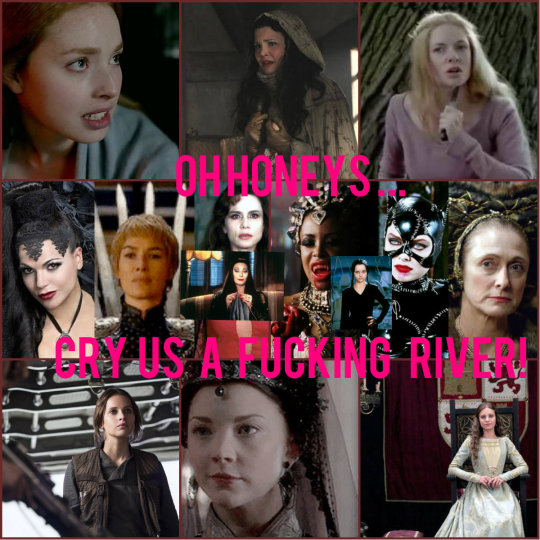
Revenge of the Mary Sue (s)! Female Protagonists in Historical Dramas: “… women can hardly be blamed for not being feminists in advance of the concept, for not stepping outside their time frame or not possessing an anachronistic sense of their own worth.” ~Red Roses: Blanche of Gaunt to Margaret Beaufort by Amy Licence ^This is something that should be taken into account by every history buff and especially feminist history fans who are easy to jump on the bandwagon of the endless Mary-Suefication of countless historical dramas where women are showing unusual behavior from what was expected of them (according to their station). This is a common trend in Hollywood. We have it in science fiction, fantasy, drama as well. Producers think they are doing us (women) a favor but in reality they are downplaying on the other women who might not have shared these ‘larger-than-life’ qualities. Take the White Queen for example. It was a good production. I enjoyed it, same as I enjoyed all of Philippa Greggory’s books, but was it accurate? Of course not. Elizabeth Woodville was presented as a quasi-feminist Mary Sue character and her second husband, Edward IV, was the Gary Stu of all Gary Stus. They were perfect, magical, loving. Sure, they had their problems, but even when the audience was tempted to sympathize with their rivals, they still felt more sympathetic towards the Yorkist couple because why not? She was fierce, loud and was not afraid to “be a match for any man.” These words are taken from secondary sources which reputedly came from Elizabeth’s contemporaries who believed she did say these things when Edward IV tried to take advantage of her. Some of you might take this as ‘proof’ that Elizabeth was a strong woman and not the typical submissive girl the Neville women were, but was she? Or is that what the White Queen really gave us? Because I just don’t see it. Let met break it down to you: Women DID wield power over their husband’s subjects and their tenants. But this power was ultimately dependent on their personality. As Amy Licence stresses out in the next paragraph, using Joan, second wife of Henry IV of England as an example: “There had been times in Joan’s life when she was able to exert her will, to shape her destiny, when the letters she wrote to Henry IV before their marriage briefly forced the female narrative to the fore, and her actions helped direct the course of national history. Nevertheless, she was powerless to speak in her own defence as an imprisoned widow, pointing towards the conclusion that any power exercised by women was something of an illusion, which they enjoyed because their men gave them permission to do so.” She also adds that whenever women acted out of the ordinary they were demonized. Those that weren’t was because they cited precedent or biblical law. Astoundingly, there are many heroines in the bible that women could take as their role models to justify their ‘rebellious’ behavior. Deborah was used as a tool of Elizabethan propaganda in the sixteenth century. The last Tudor monarch was often painted next to female saints, classical and biblical figures whose acts validated Elizabeth I’s claim and her uniqueness as an unwed female monarch. Elizabeth Woodville’s actions, if she really did say all of those things, must be viewed in the same context. She didn’t stand up to Edward IV because she thought ‘I am going to set an example to all male rogues who think of taking advantage of defenseless women’. No! She thought of her gender in the same terms as her peers did. Those words to Edward were her faith talking, nothing else. Formerly, the Earl of March, the eldest surviving son of the slain Richard Plantagenet Duke of York and Cecily Neville, had a reputation as a lady’s man. As such, Elizabeth Woodville would have been careful with how she carried herself with him. After all, she was a widow and she was dependent on the new regime’s mercy if she wanted to keep her children’s fortunes intact. After her first husband, John Grey of Grosby died, she was almost penniless. When she became untouchable -and thus, desirable- to Edward IV, she saw an opportunity to turn the tables around, back in her family’s favor. Her behavior was typical of any fifteenth century courtier, especially a widow who previously belonged to the losing party. Ironically though, the same behavior that many fans championed Elizabeth for having is condemned as her rivals. This is not strange. The White Queen acts as a Victorian retelling of the wars of the roses or as it is now popularly called “the cousins’ war”. It is a story where Elizabeth and her mother are magical women who capture the attention of a dashing royal rogue called Edward IV who deposed an evil dynasty who was corrupt and crazy (to paraphrase Margaret Beaufort’s second husband in the series). As such, every other woman who is not part of the Woodville clan, has to be by definition ‘ugly’, ‘greedy’ or simply ‘less than’. But is it fair? In entertainment you can say it is fair. It is fiction and they can do whatever they want in the name of ratings; but when it comes to history it becomes a problem. These women were not saints, neither were they power-hungry villains. They were raised to be the perfect consorts, to do anything that was in the best interest of their families. Nothing more, nothing less. They often switched sides for that same purpose and whenever they broke conventional norms, they justified by citing religious or historical precedence. And let's not get started over the Hollywood Mary Sue-fication of other historical figures like Elizabeth I of England and Mary, Queen of Scots. People love their larger-than-life characters. It gives us something to aspire to, something to look forward to. If they could do it, then so can we, right? But after you read about their true stories, you realize that their lives were anything but pleasant. Elizabeth I navigated through murky waters to keep her throne. Even when she defeated all of her enemies, she wasn't happy. This page, Tudor Brasil: Dinastia Tudor, Renascimento e Outros Períodos da História, The Anne Boleyn Files,Queen to History, Tudor Nerds with Glasses,Tudors: Fact vs Fiction, and many other historical pages have done many articles on how complicated her reign was. Even when she saw herself as an exception to the rule of 'women can't be good rulers' that Protestant John Knox about, she still believed that women were inferior to men because that is how she was raised to think. If she were to spouse any view that challenged this notion, she would have been deposed in her first year as Queen. This isn't to say she wasn't exceptional. She was, but not for the reasons that feminists and Hollywood portray her as. When she delivered her famous speech at Tilbury in 1588, she didn't wear full armor -as depicted in the sequel to Kapur's Elizabeth, Elizabeth: The Golden Age. She wore simple breastplate and female dress. Some historians like John Guy in his latest biography on Elizabeth, doubt the veracity of her words, citing that Elizabeth's speeches were often written by her councilors and sometimes they put words to her mouth to make her seem as greater than she actually was. Reign's take on Mary, Queen of Scots is probably one of the best examples of Mary-Suefication with Mary, Queen of Scots being depicted as ahead of her times, self-righteous and a victim as opposed to her mother-in-law and cousin-from-hell, Catherine Medici and Elizabeth I of England respectively. And last but not least, we have Isabel in the Spanish series Isabel. And I know what you are going to say 'the series did her justice'. It did in some ways, but it also fell into the same trap that other historical dramas with a female protagonist fell into. The series gave us a nuance portrayal of the Catholic Kings, but it also gave us instances where Isabel was too perfect, showing she was ahead of her times in her line of thinking. Once again, she wasn't. Even when she did spouse progressive ideas in regards to women, she still held the same beliefs regarding gender as her husband and the rest of her peers. Even the women who took up arms against their spouses or went to court suing them (and there are various cases on the latter), still held the same convictions that they did when they were young and taught that women were inferior to men, or in some cases, a deformed version of man. For more info on this subject, I recommend the following books: 1. Elizabeth: The Forgotten Years by John Guy 2. Elizabeth: The Struggle for the throne by David Starkey 3. Tudor by Leanda de Lisle 4. Tudors vs Stewarts by Linda Porter 5. Anne Boleyn Collection by Claire Ridgway 6. Red Roses: Blanche of Gaunt to Margaret Beaufort by Amy Licence/ In Bed With the Tudors & Six Wives and the Many Mistresses of Henry VIII by Amy Licence 7. Jezebel by Kyra Cornelius Kramer 8. Isabella: Warrior Queen by Kirstin Downey 9. Isabel La Catolica by Cristina Hernando 10. Mary, Queen of Scots by Antonia Fraser 11. The Woodvilles by Susan Higginbotham
5 notes
·
View notes